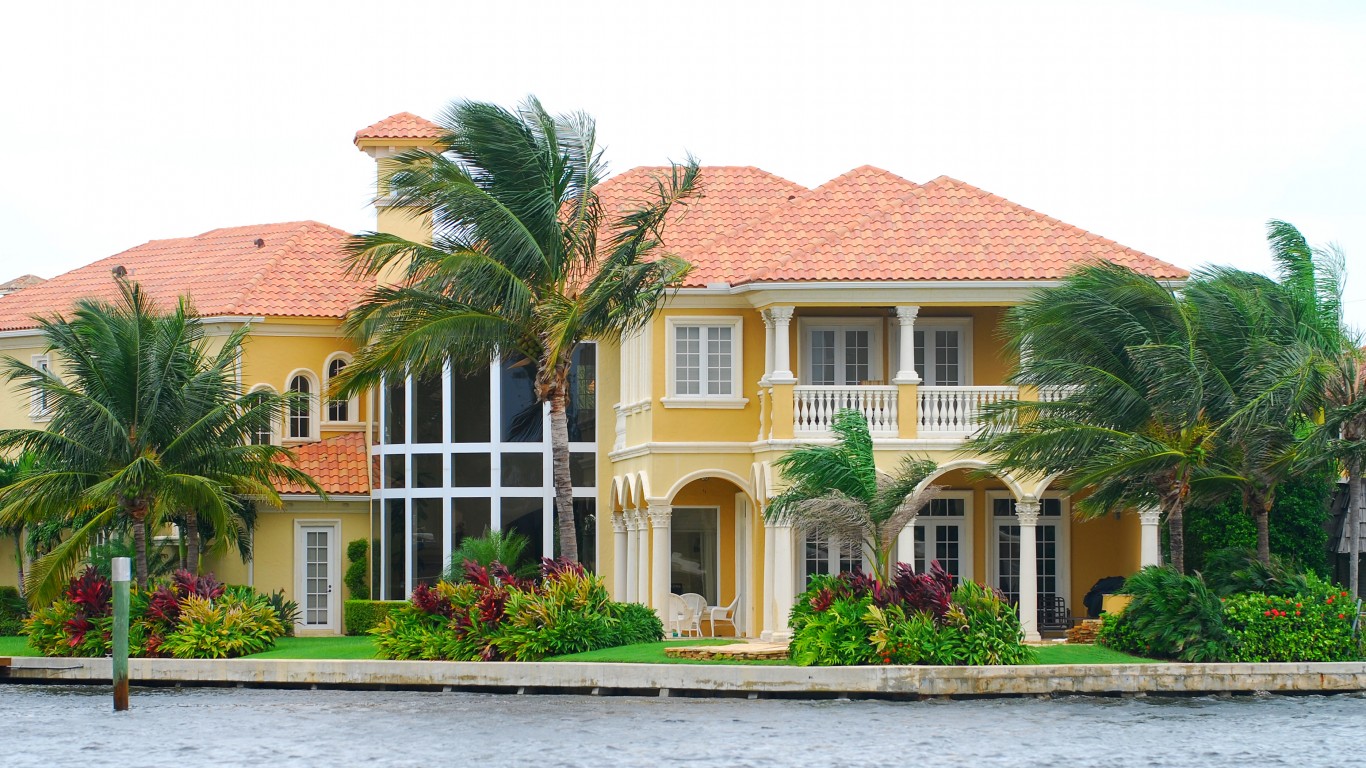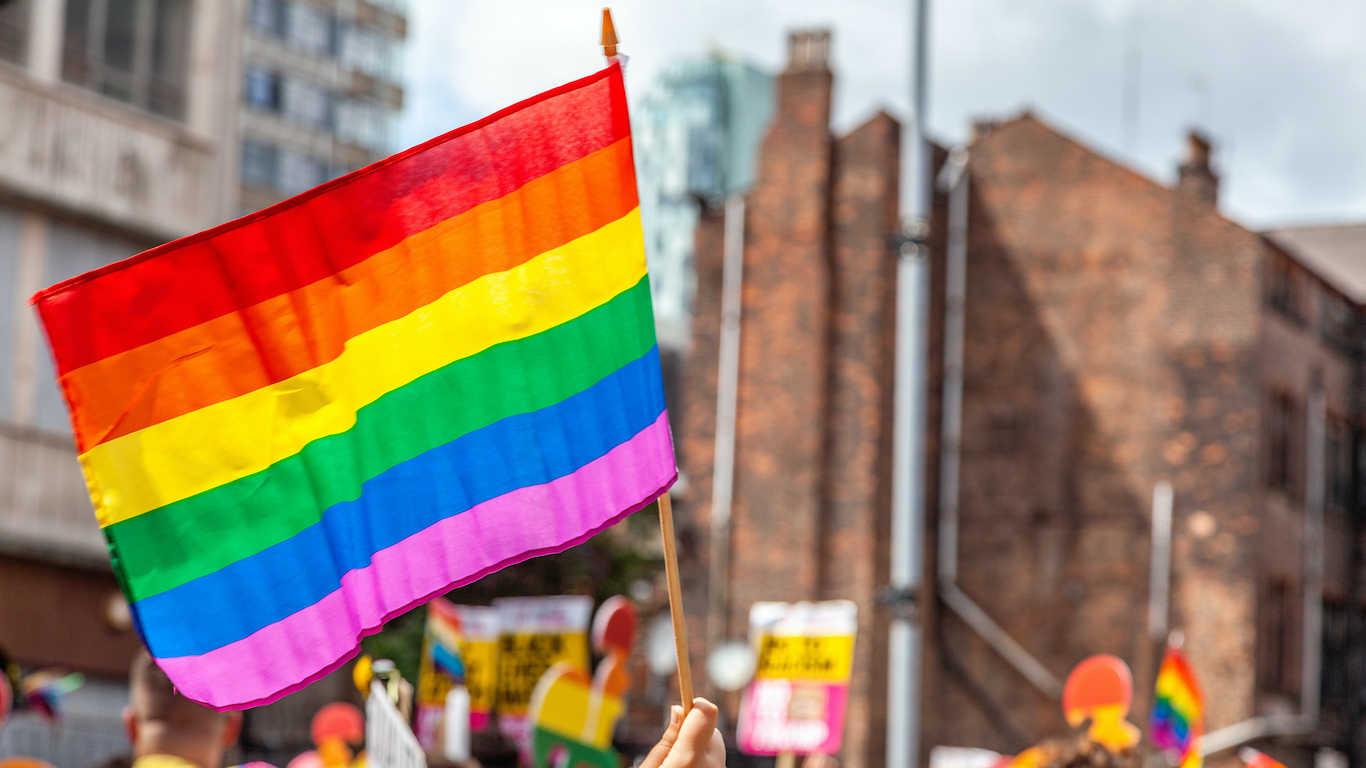
Even though the world is slowly becoming a more welcoming place for gay people, there are still many places where same-sex relationships are considered criminal behavior. According to the to the International Lesbian, Gay, Bisexual, Trans and Intersex Association’s latest report, 70 members of the United Nations punish people for being gay as of March 2019.
To commemorate the Stonewall riots in 1969 that launched the gay rights movement June was chosen as LGBT Pride Month. As Pride Month begins, 24/7 Tempo has created a list of the countries where it is difficult to be gay.
To compile the list, we reviewed the 13th edition of the ILGA report “State-Sponsored Homophobia” released in December 2019. We also reviewed the Pew Research story “A global snapshot of same-sex marriage.” Data on population, gross national income per capita, percentage of people living below national poverty line, and literacy rate were gathered from the World Bank. The amount of U.S. aid was gathered from foreignassistance.gov.
Click here to see the countries where it is difficult to be gay
Many of the countries on this list are predominantly Muslim countries that implemented Islamic rules or Sharia law as part of their penal code. A few countries are also Christian countries located in Oceania. Geographically, most of the countries are in the Middle East, Africa, the Caribbean, and Asia.
Since the last edition of the ILGA report, Angola, Trinidad & Tobago, and India repealed laws criminalizing same-sex conduct. However, Chad went in the other direction and criminalized such acts in 2017. The ILGA report says that of the 70 U.N. nations that criminalize same-sex relationships, 26 criminalize only such acts between men; the remaining 44 criminalize consensual same-sex sexual activity among all genders.
There are six U.N. member nations that impose the death penalty on consensual same-sex sexual acts: Iran, Saudi Arabia, Nigeria, Sudan, Yemen, and Somalia. In five other U.N. members, the death penalty could be imposed as a possible punishment: Mauritania, United Arab Emirates, Qatar, Pakistan, and Afghanistan. These are the countries where being gay is legally punishable by death.
More and more countries are recognizing same-sex marriages. To date, 31 out of the 195 nations in the world have legalized same-sex marriage. Here are the countries where same-sex marriage is officially legal.
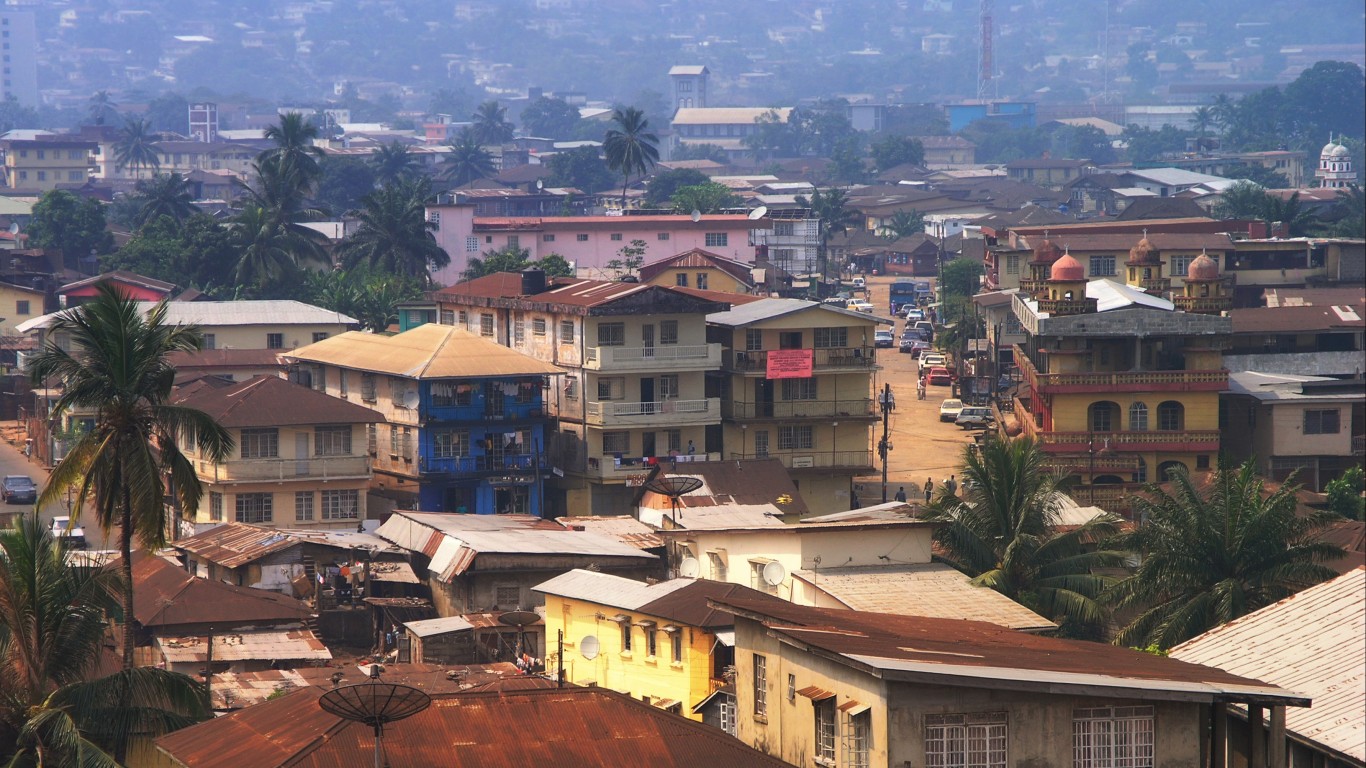
38. Sierra Leone
> Maximum anti-gay penalty: 10 years in prison
> Population: 7,650,154
> GNI per capita, PPP: $1,490
> Literacy rate (% of people 15 and above): 43%
> Amount of US aid in 2020: $11.0 million
The African nation of Sierra Leone can impose a prison term of up to 10 years for homosexual conduct. The law is not strictly enforced and applies only to men. Still, LGBT organizations have reported that health care workers in Sierra Leone have refused to treat abused LGBT patients after discovering their identities, according to a Dignity Association study. LGBT activists have been murdered, including Fannyann Eddy. The founder of the Sierra Leone Lesbian and Gay Association was slain in 2004.
[in-text-ad]
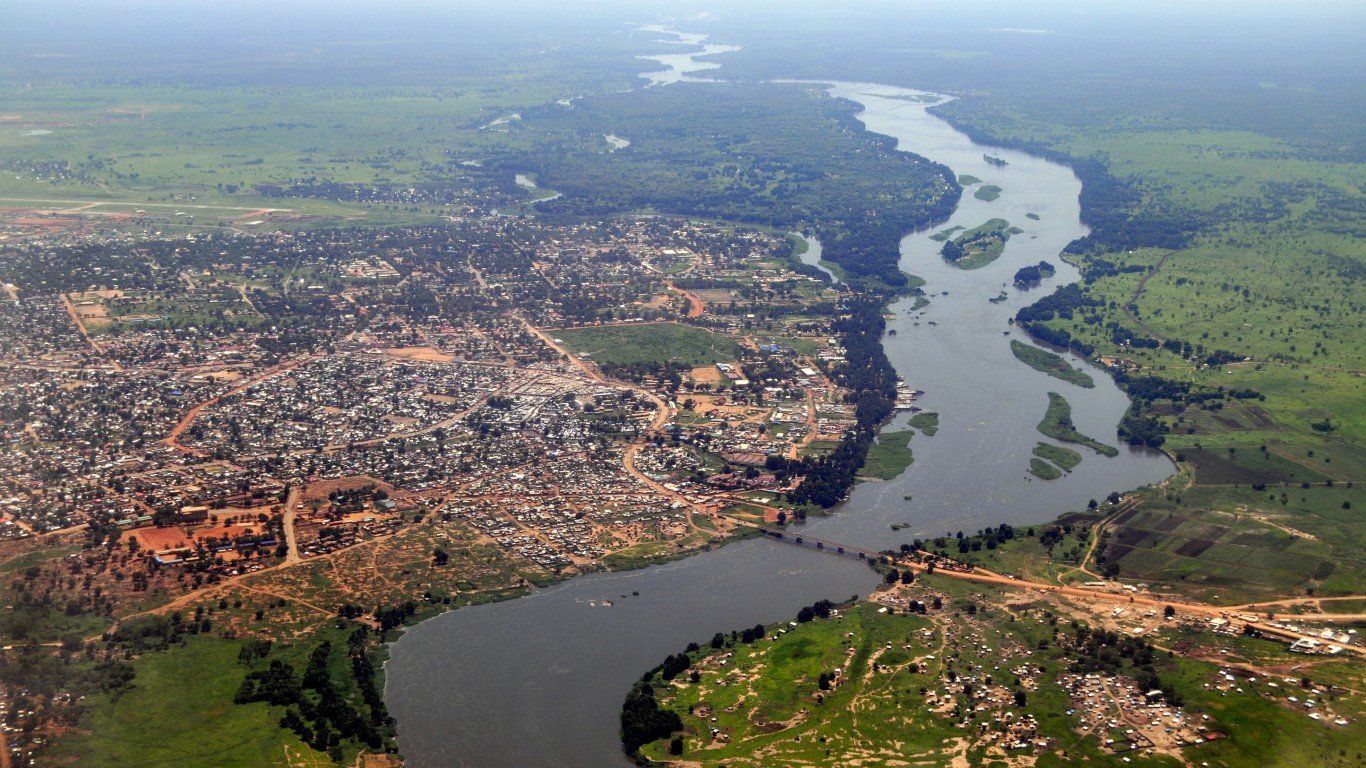
37. South Sudan
> Maximum anti-gay penalty: 10 years in prison
> Population: 10,975,920
> GNI per capita, PPP: N/A
> Literacy rate (% of people 15 and above): 35%
> Amount of US aid in 2020: $79.5 million
The maximum penalty for homosexual conduct in South Sudan, which considers the activity “against the order of nature,” is 10 years in prison and that person of any gender may also be liable for a fine.
Many Christian leaders in the country, which became a nation in 2011, have called “homosexuality” a “perversion.” In August 2018, LGBT human rights defenders were forced to leave South Sudan after getting threats from national security forces. Some public officials have spoken against the gay community. In 2012, James Mawut Lueth, a member of South Sudan’s governing Sudan People’s Liberation Movement, said in a news interview, “Our culture condemns in the most serious terms same sex marriage, so also our religions, Christianity and Islam in particular.”
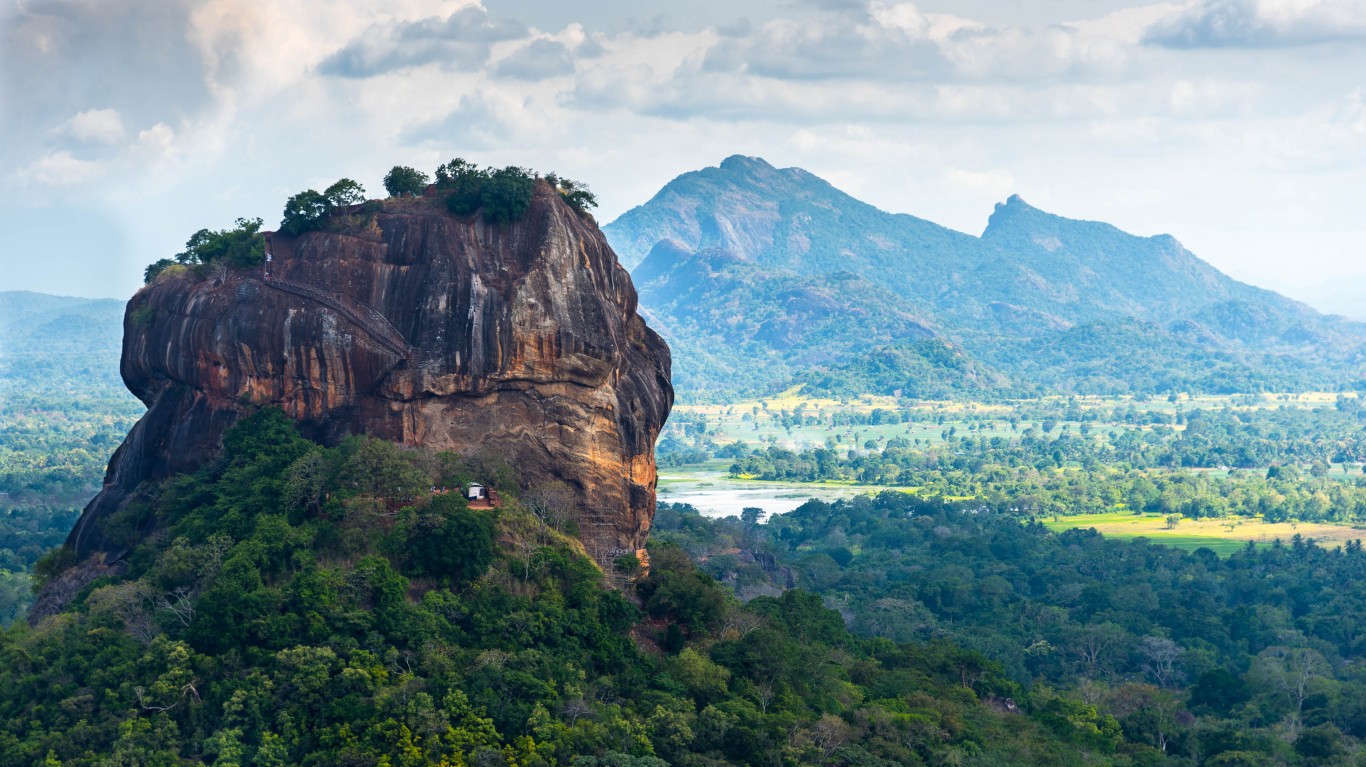
36. Sri Lanka
> Maximum anti-gay penalty: 10 years in prison
> Population: 21,670,000
> GNI per capita, PPP: $13,110
> Literacy rate (% of people 15 and above): 92%
> Amount of US aid in 2020: $6.47 million
Sri Lanka, an island nation south of India, imposes the maximum penalty on anyone of any gender for homosexual conduct of 10 years in prison. A 2016 report by Human Rights Watch found that the presence of the law creates a chilling effect on LGBT people who are subjected to extortion and violence.
Public officials have expressed hostility toward gay people. In a January 2017 interview, Minister for Justice Wijeyadasa Rajapaksa said, “under no circumstance are we going to change that law” — referring to the sections prohibitng homosexual acts. He also called “homosexuality” a “mental disorder.”

35. St. Kitts & Nevis
> Maximum anti-gay penalty: 10 years in prison
> Population: 52,441
> GNI per capita, PPP: $28,530
> Literacy rate (% of people 15 and above): N/A
> Amount of US aid in 2020: 0
On the Caribbean island nation of St. Kitts & Nevis, the maximum penalty for homosexual conduct for males only is 10 years in prison, with or without hard labor.
In 2012, after an openly gay teenager was shot in his head and chest — a shooting that left him blind and paralyzed — there was strong public outcry that the victim’s sexual orientation was why he was attacked. In 2018, a Human Rights Watch report quoted a gay male from St. Kitts and Nevis who said, “I have to leave to be me” because of the discriminatory environment.
[in-text-ad-2]
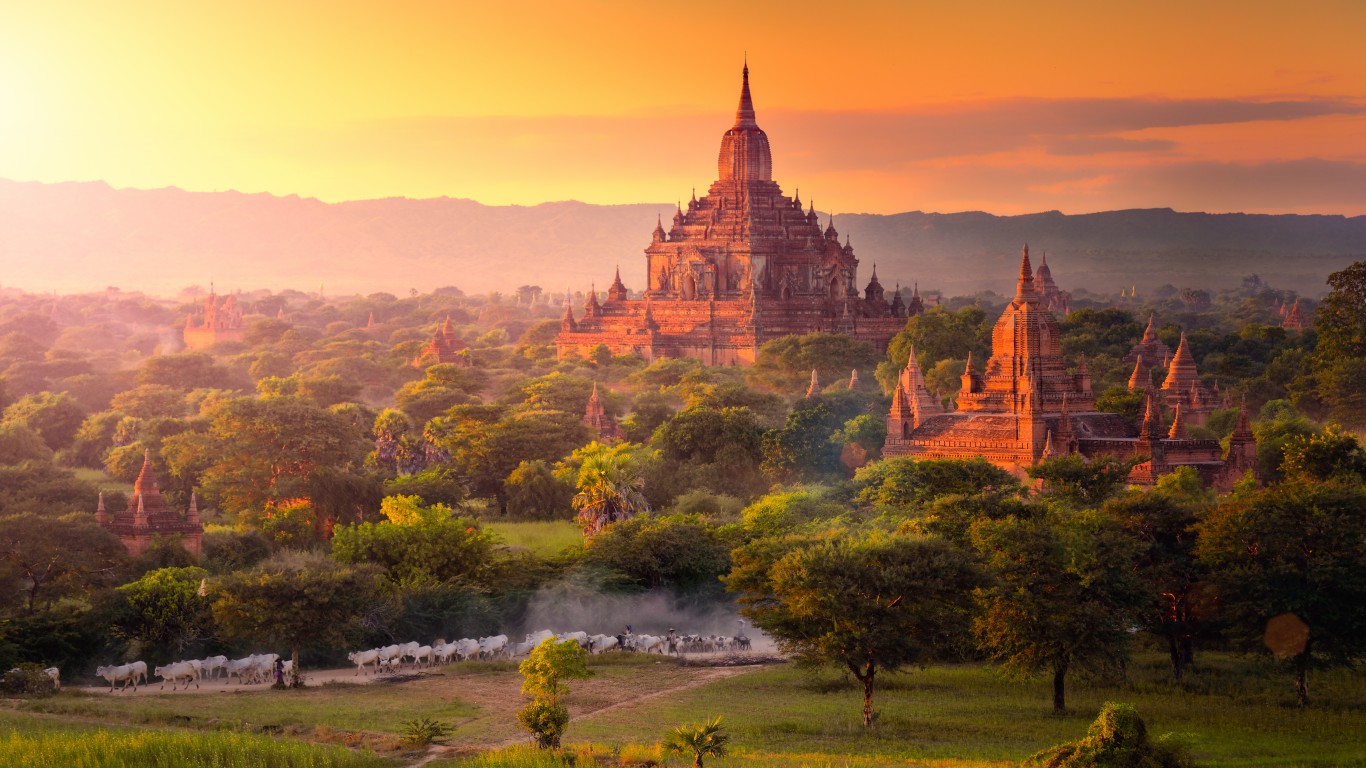
34. Myanmar
> Maximum anti-gay penalty: 10 years in prison
> Population: 53,708,395
> GNI per capita, PPP: $6,500
> Literacy rate (% of people 15 and above): 76%
> Amount of US aid in 2020: $39.8 million
The maximum penalty for homosexual conduct among men in Myanmar (formerly called Burma) is 10 years in prison, and the person found guilty might also be liable for a fine.
Activists say that LGBT people in Myanmar are targeted under a section of the Police Act that is known as the “Darkness Law.” This permits authorities to detain someone whose face is covered or disguised. Acitivists have chided the film industry in Myanmar for perpetuating negative stereotypes about gay people. Society has become more tolerant in Myanmar where gay pride festivals and events have been held in recent years.
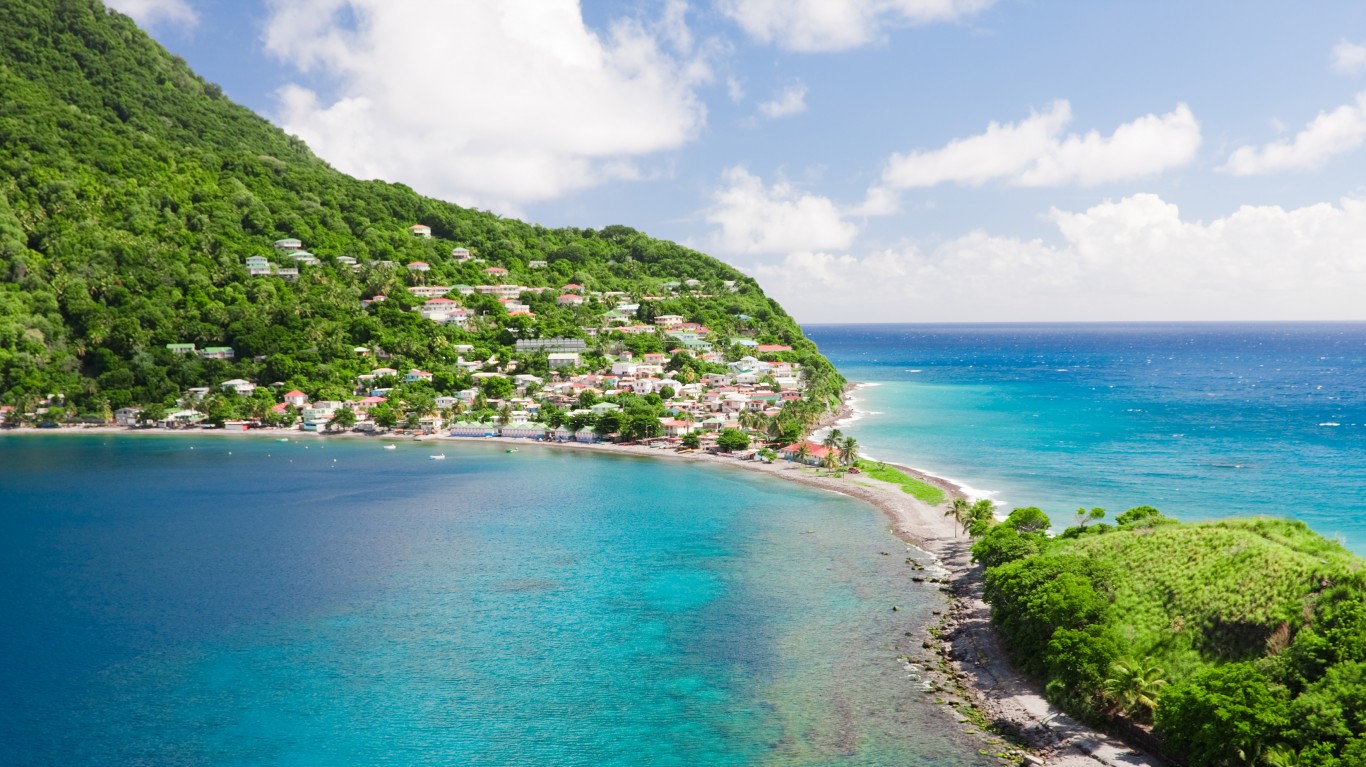
33. Dominica
> Maximum anti-gay penalty: 10 years in prison
> Population: 71,630
> GNI per capita, PPP: $10,140
> Literacy rate (% of people 15 and above): N/A
> Amount of US aid in 2020: $11,891
The maximum penalty for homosexual conduct in Dominica, a tiny island in the Lesser Antilles in the Caribbean, is 10 years in prison for adults of any gender.
In 2012, Dominica News Online reported that Education Minister Petter St. Jean “has said that the problem of anti-social behavior and homosexuality in Dominica’s schools is much bigger than government imagined. A committee was set to stop the spread of such “deviant” behaviors. Two American men on a cruise to Dominica were arrested for engaging in “indecent exposure” in public. The men said they were held in inhumane conditions and charged with indecent exposure. Activists say open LGBT people complain of physical abuse.
[in-text-ad]
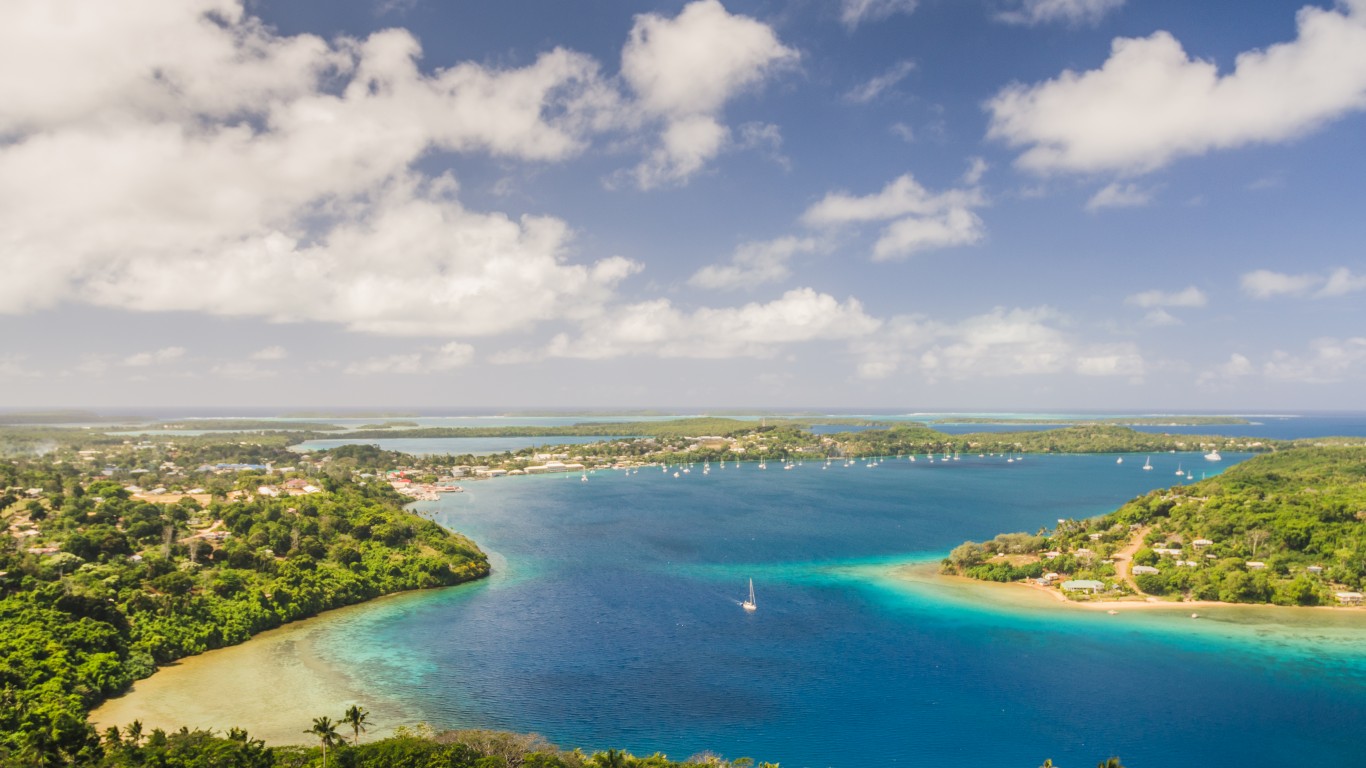
32. Tonga
> Maximum anti-gay penalty: 10 years in prison
> Population: 103,200
> GNI per capita, PPP: $6,520
> Literacy rate (% of people 15 and above): 99%
> Amount of US aid in 2020: $293,989
The law in Tonga, a conservative Christian kingdom in the South Pacific east of Australia, calls for imprisonment of men for the crime of sodomy against a person or bestiality with any animal for up to 10 years. The nation’s attorney general said in 2013 that there has never been a conviction where consenting adults were charged for committing sodomy.
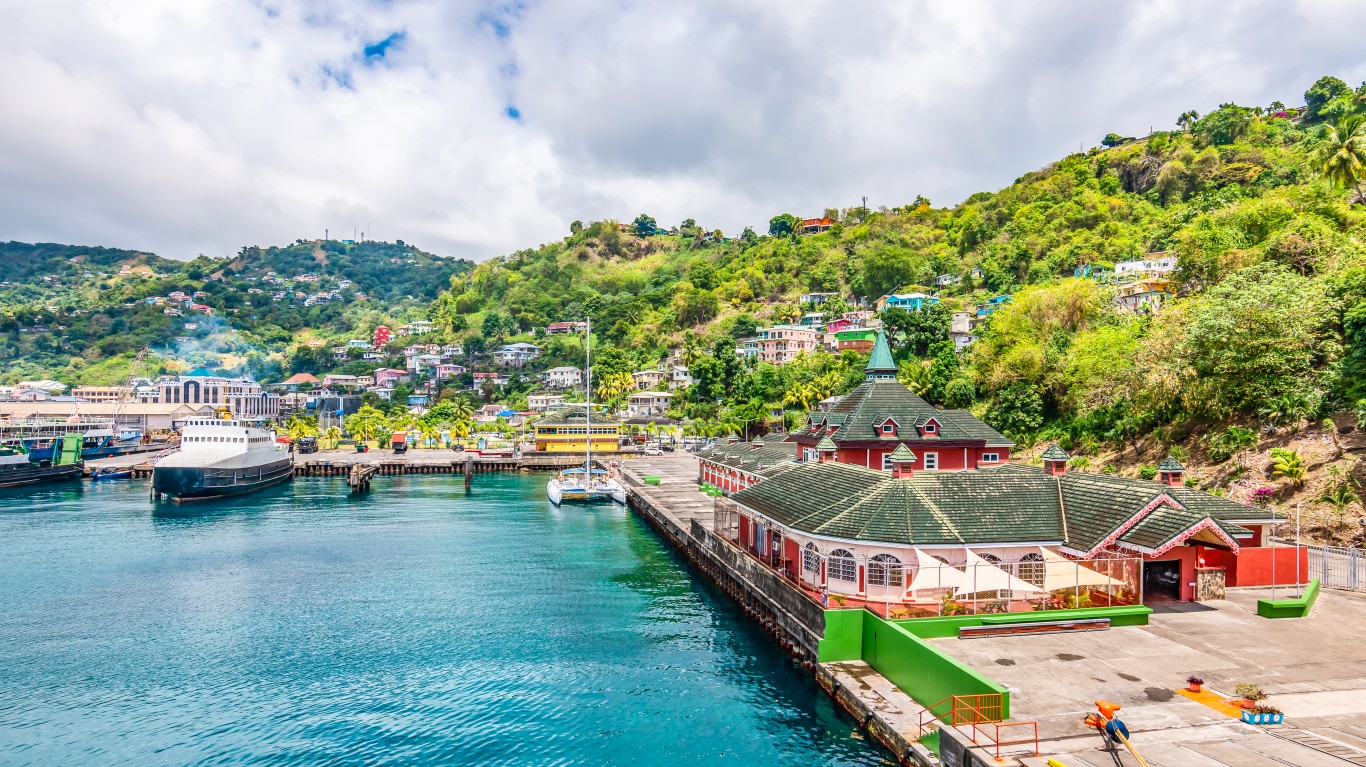
31. St. Vincent & the Grenadines
> Maximum anti-gay penalty: 10 years in prison
> Population: 110,210
> GNI per capita, PPP: $12,160
> Literacy rate (% of people 15 and above): 96%
> Amount of US aid in 2020: 0
The maximum penalty for homosexual conduct in St. Vincent & the Grenadines, an island nation in the Caribbean, is 10 years in prison for adults of any gender.
In 2010, Prime Minister Ralph Gonlsalves, made disparaging comments about opposition Senator Vynnette Frederick, suggesting she was a lesbian. In 2015, Nigel Thomas, a gay author from St. Vincent, published a novel after he moved to Canada, based on his personal experiences of violence and prejudice against homosexuals while growing up on the island.
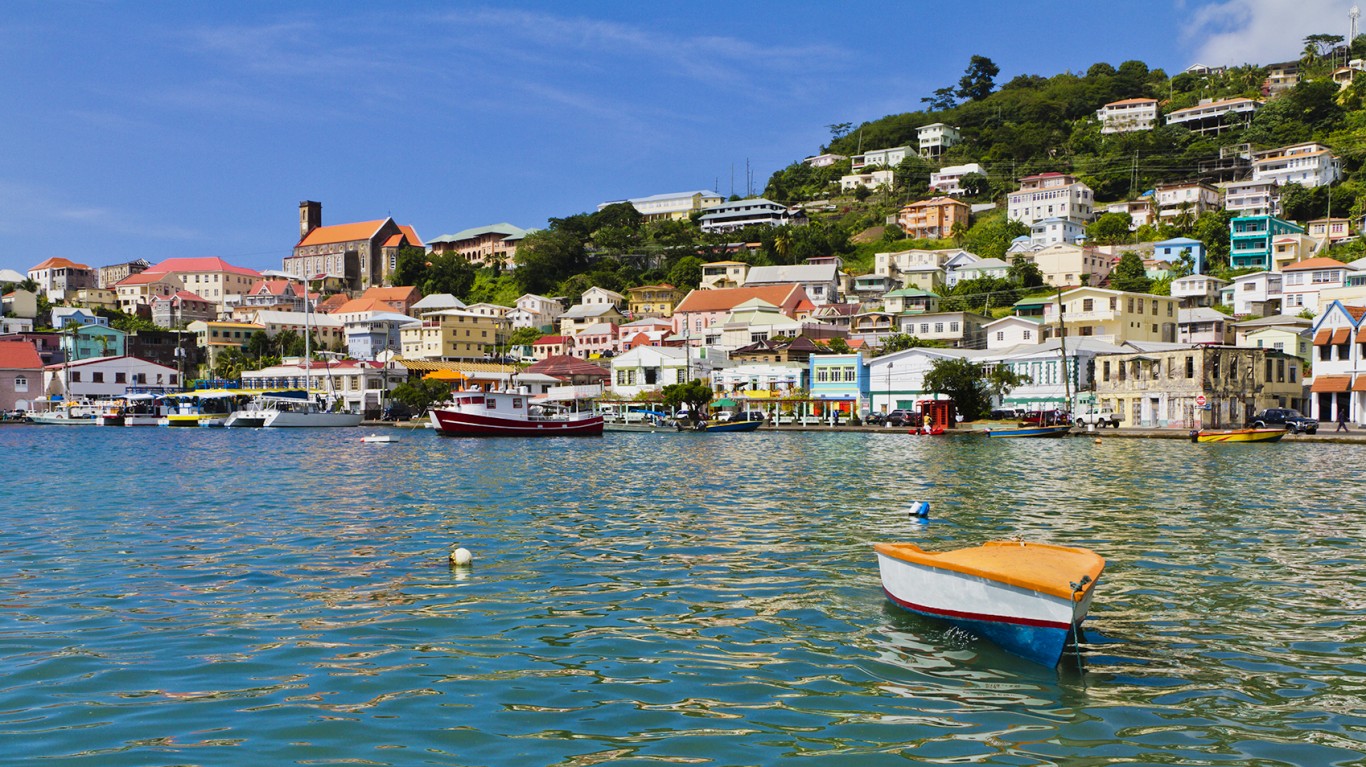
30. Grenada
> Maximum anti-gay penalty: 10 years in prison
> Population: 111,450
> GNI per capita, PPP: $14,100
> Literacy rate (% of people 15 and above): 99%
> Amount of US aid in 2020: ($50,001)
On the island of Grenada, in the West Indies in the Caribbean, homosexual conduct among men is considered an “unnatural connexion” and is punishable for up to 10 years in prison with hard labor.
A Human Rights Watch report from 2018 found that LGBT people in Grenada face discrimination from the church, family, schools, and the police. Other reports indicate the younger generation in Grenada is more tolerant of LGBT people because of more positive images in the media.
[in-text-ad-2]
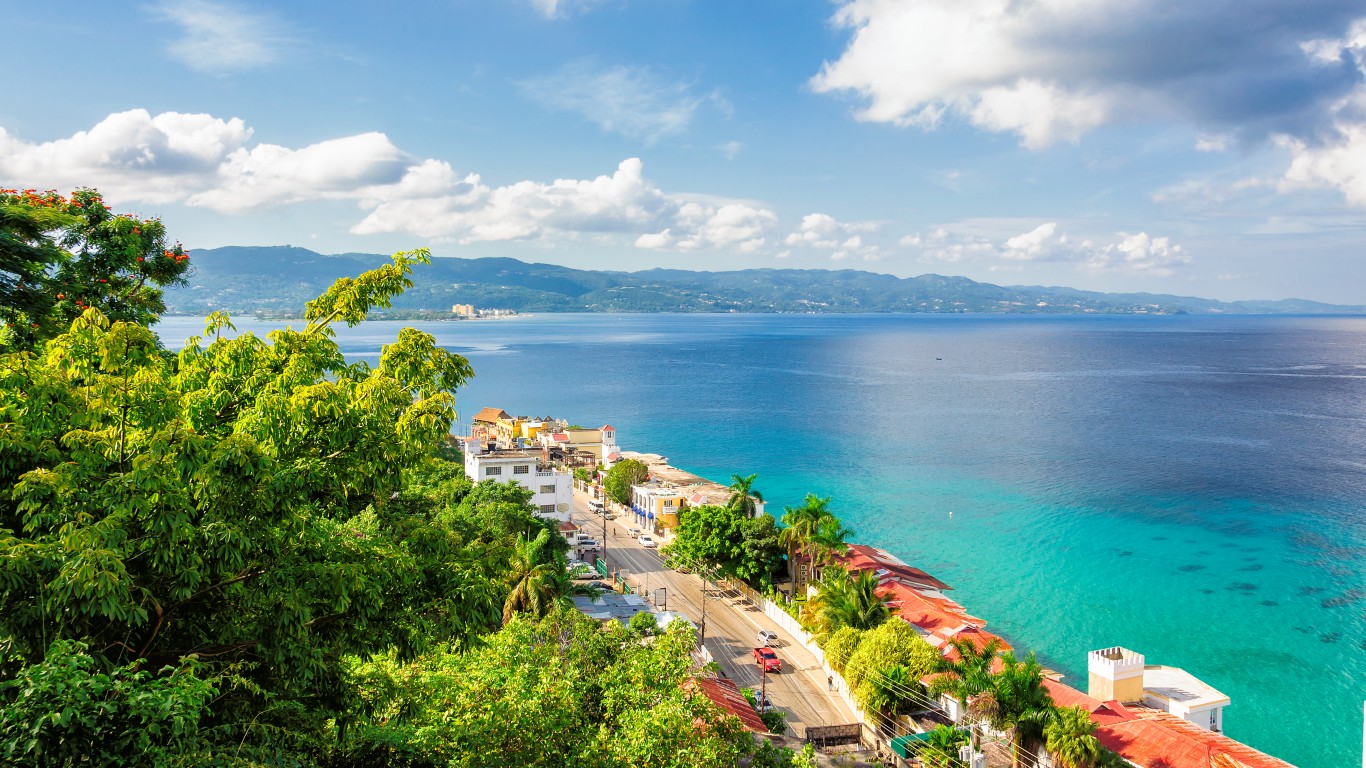
29. Jamaica
> Maximum anti-gay penalty: 10 years in prison
> Population: 2,934,860
> GNI per capita, PPP: $8,900
> Literacy rate (% of people 15 and above): 88%
> Amount of US aid in 2020: $4.59 million
Jamaica, an annual tourist destination for thousands of Americans, punishes males homosexuals with a prison term of up to 10 years with hard labor.
At one time, Jamaica had had a reputation as being one of the most homophoic countries on Earth. One poll held in 2014 indicated that up to 91% of Jamaicans believe lawmakers should not repeal so-called buggery laws. In August 2017, Jamaican fashion designer, reality TV star, and gay LGBT activist Dexter Pottinger was found stabbed to death in his Kingston home.
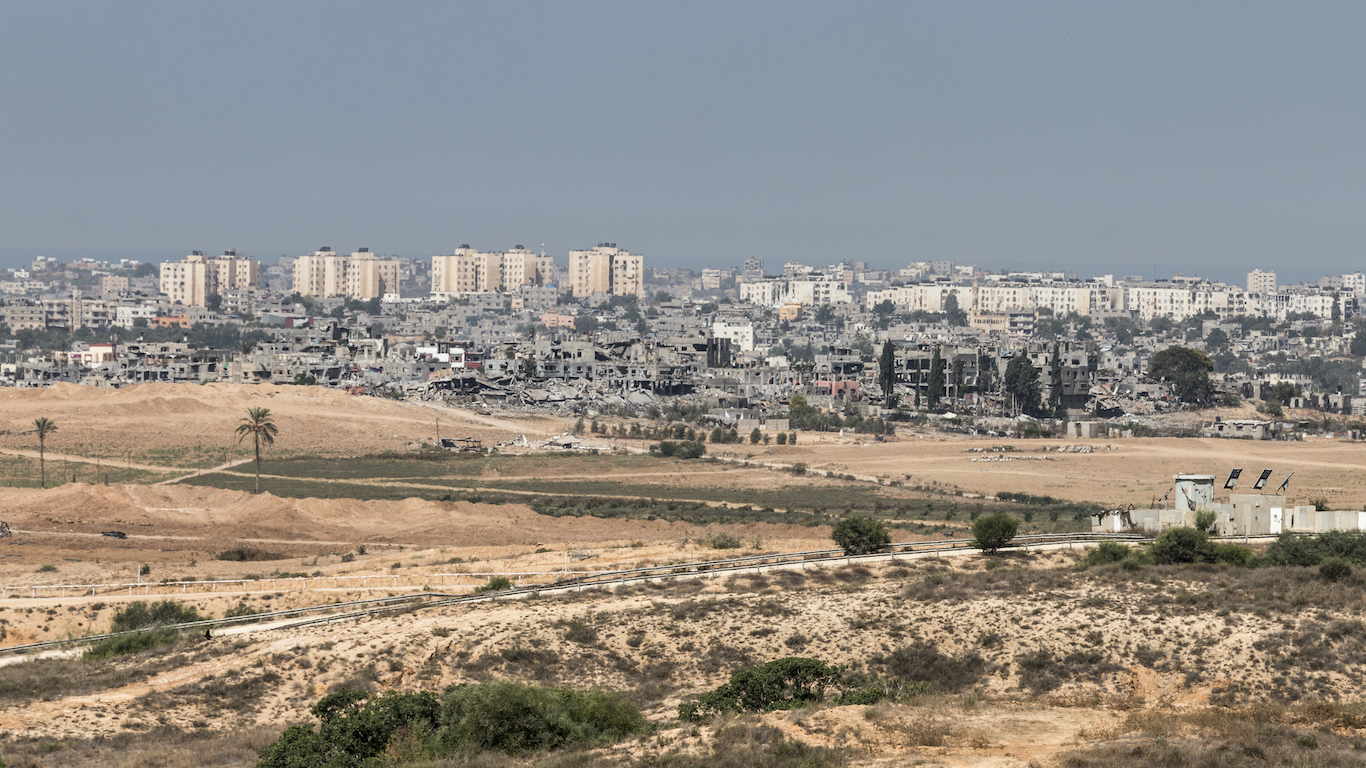
28. West Bank/Gaza
> Maximum anti-gay penalty: 10 years in prison
> Population: 4,569,090
> GNI per capita, PPP: $6,000
> Literacy rate (% of people 15 and above): 97%
> Amount of US aid in 2020: $5.50 million
In the West Bank/Gaza, homosexuality is called a crime against nature and is a felony, with prison terms for males up to 10 years. In 2016, Hamas executed one of its commanders, Mahmoud Ishtiwi, in Gaza after he was detained for a year for “moral turpitude,” referring to homosexuality.
[in-text-ad]
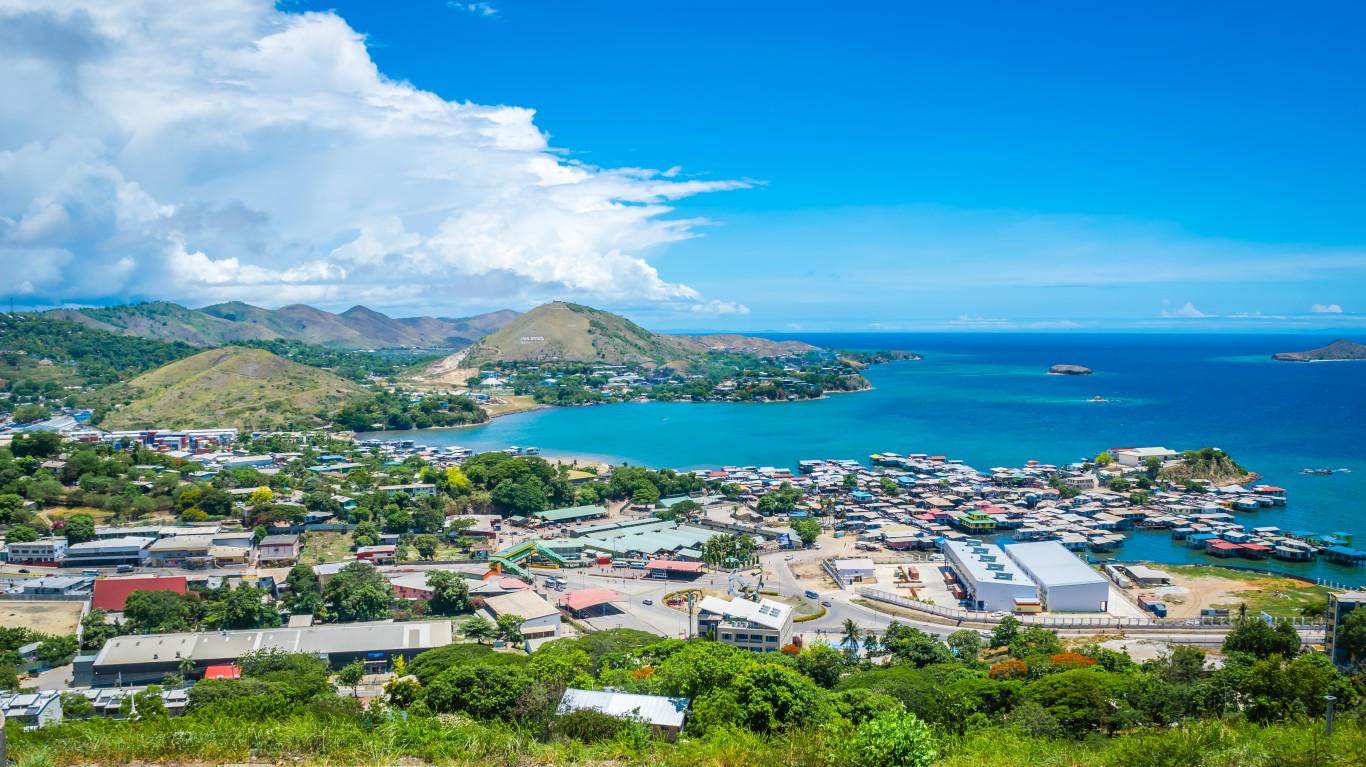
27. Papua New Guinea
> Maximum anti-gay penalty: 14 years in prison
> Population: 8,606,316
> GNI per capita, PPP: $4,220
> Literacy rate (% of people 15 and above): 62%
> Amount of US aid in 2020: $1,113,425
Papua New Guinea, located on the eastern half of New Guinea and its offshore islands in the southwestern Pacific, can imprison men found guilty of homosexual activity for up to 14 years.
Police have reportedly harassed and discriminated against gay men in Papua New Guinea, and attempts to decriminalize same-sex relations have met with opposition from Christian groups. In 2012, Prime Minister Peter O’Neill said there were “strong feelings against homosexuality in the country,” which has “yet to accept such sexual openness.”
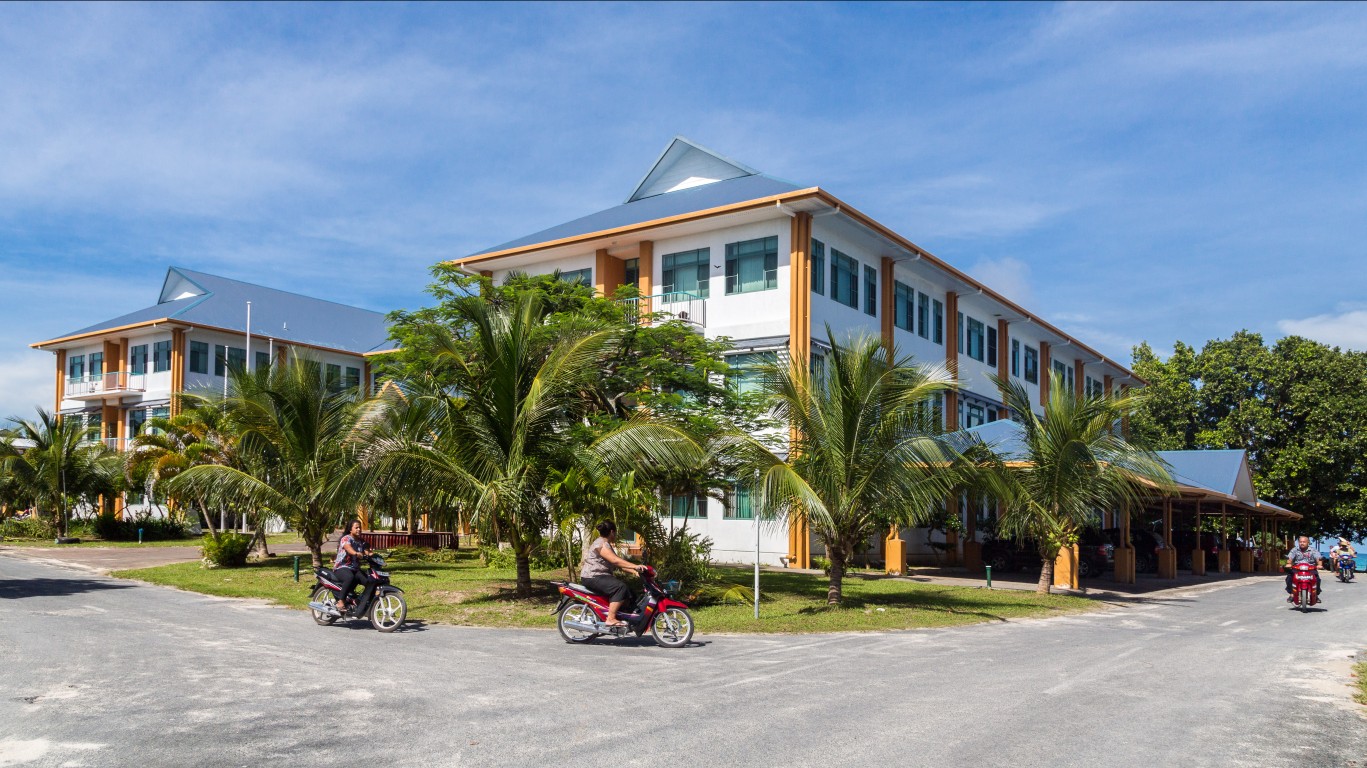
26. Tuvalu
> Maximum anti-gay penalty: 14 years in prison
> Population: 11,510
> GNI per capita, PPP: $6,100
> Literacy rate (% of people 15 and above): N/A
> Amount of US aid in 2020: N/A
Tuvalu, a tiny island northeast of Australia in the South Pacific, considers homosexual activity an “unnatural offense” under its penal code, and a man convicted of the felony could face a prison term of up to 14 years.
In 2013, Tuvalu voted in favor of the Asian and Pacific Ministerial Declaration on Population and Development, which included references to sexual orientation and gender identity-related issues, including violence and discrimination against gay people. Even so, a U.S. Department of State Report on Human Rights in 2016 indicated that social stigma or intimidation prevents LGBT people from reporting incidents of violence based on sexual orientation.
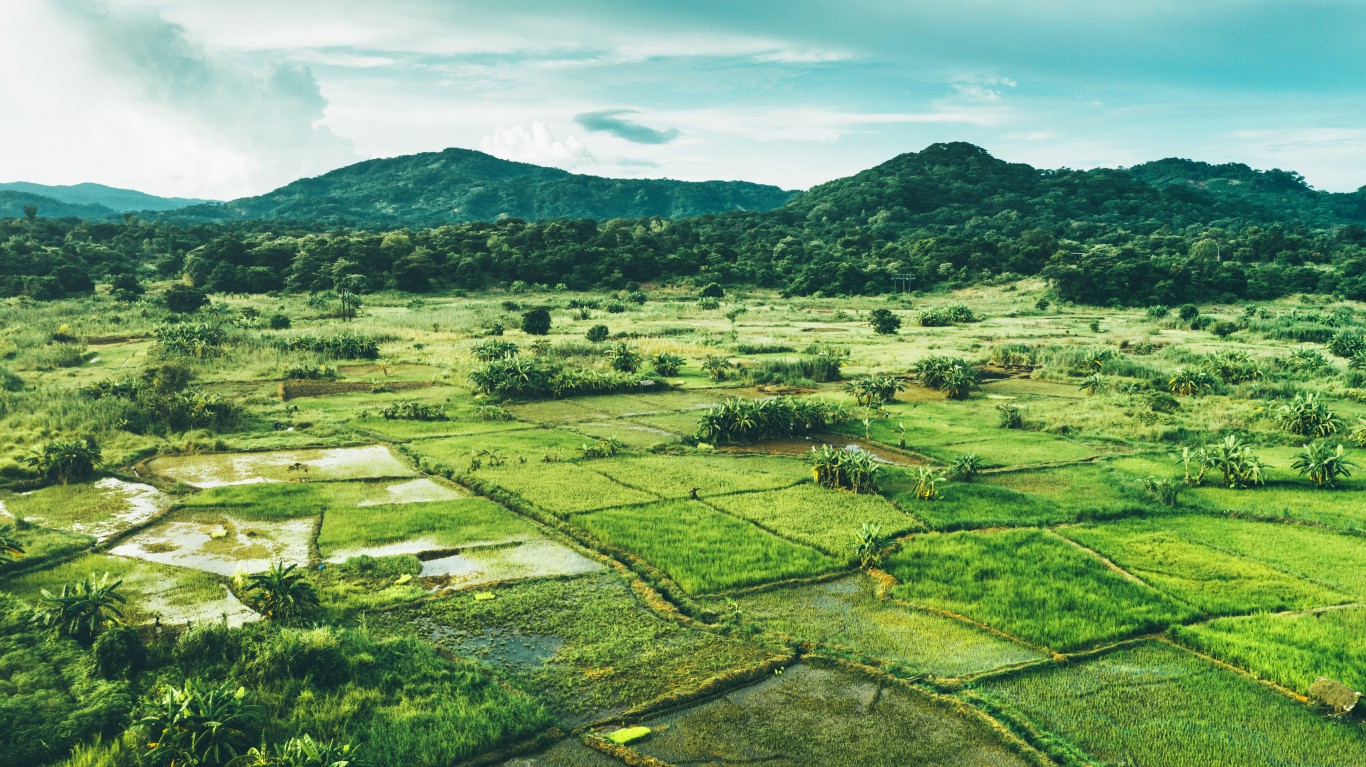
25. Malawi
> Maximum anti-gay penalty: 14 years in prison
> Population: 18,143,315
> GNI per capita, PPP: $1,310
> Literacy rate (% of people 15 and above): 62%
> Amount of US aid in 2020: $50.7 million
People of any gender in the landlocked southeastern African nation of Malawi who are found guilty of same-sex conduct face imprisonment for as many as 14 years, with or without corporal punishment. In 2010, the nation expanded its criminalization of same-sex relationships to include women, who are liable for a prison term of up to five years.
A Human Rights Watch study in 2018 found that LGBT people face “routine violence and discrimination in almost all aspects of their daily lives,” including police abuse and arbitrary detention. In 2012, President Joyce Banda, who had promised to repeal anti-sodomy laws after her predecessor died, backpedaled on this pledge after taking office.
[in-text-ad-2]
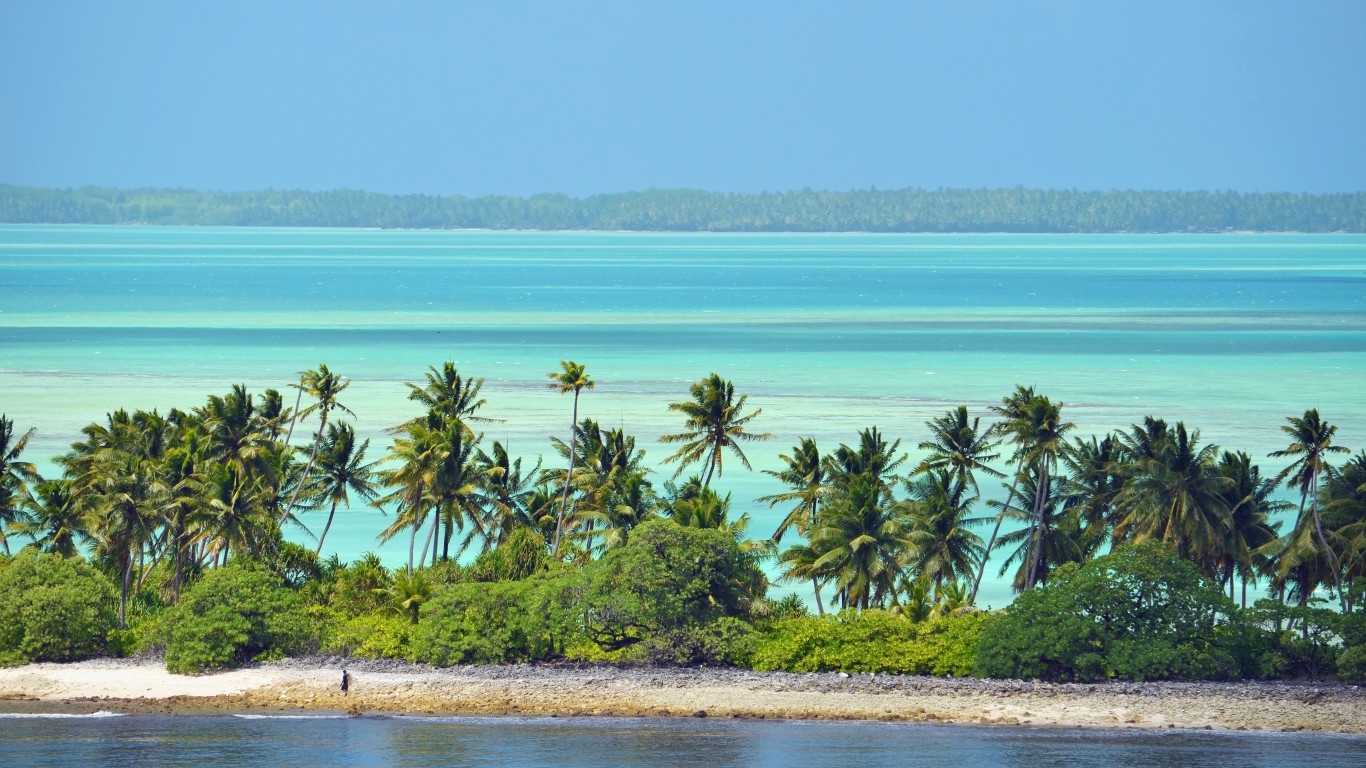
24. Kiribati
> Maximum anti-gay penalty: 14 years in prison
> Population: 115,850
> GNI per capita, PPP: $4,410
> Literacy rate (% of people 15 and above): N/A
> Amount of US aid in 2020: 0
Men in Kiribati, a country in the central Pacific Ocean, who engage in same-sex conduct can be imprisoned for up to 14 years. However, to date there has been no known arrest made on that basis. The nation’s employment code forbids discrimination based on sexual orientation. Homosexuality is still a “taboo” in the country, and local communities regard it as “immoral.”
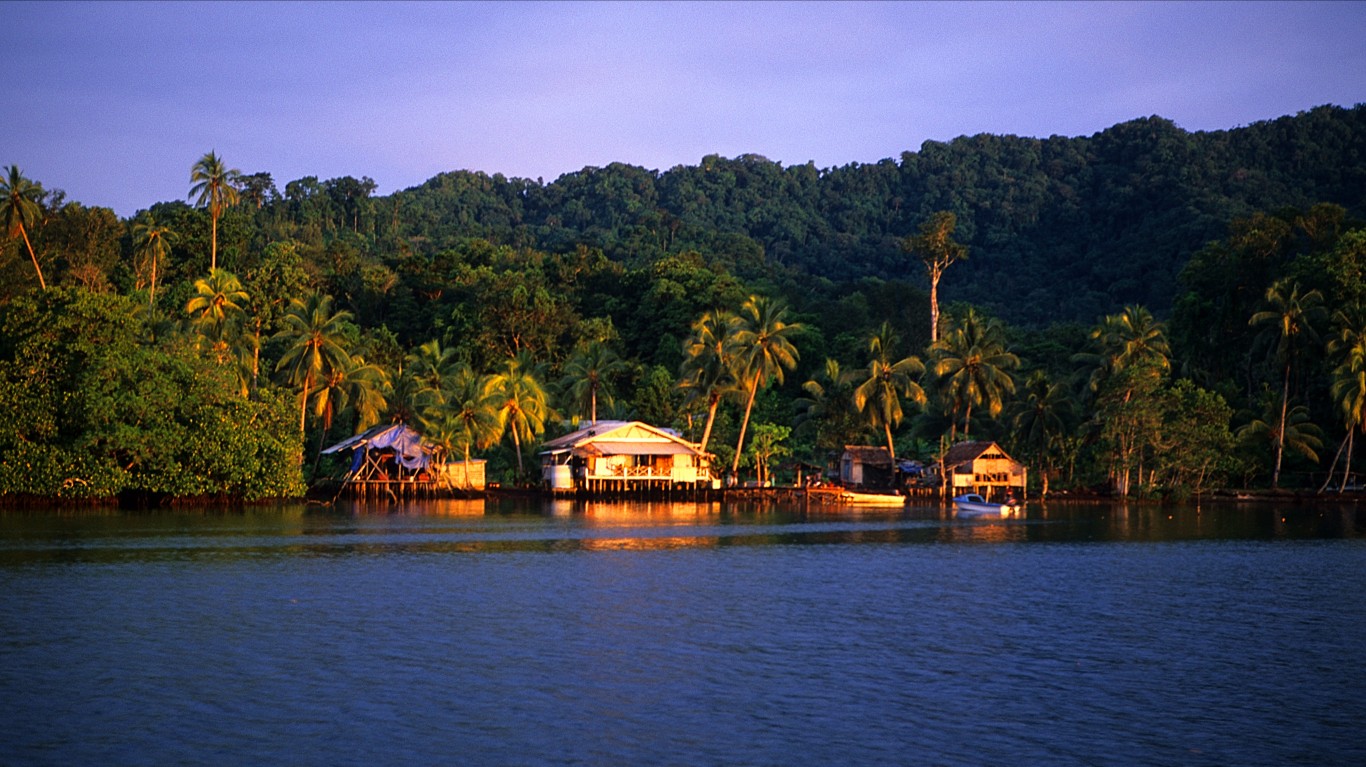
23. Solomon Islands
> Maximum anti-gay penalty: 14 years in prison
> Population: 652,860
> GNI per capita, PPP: $2,320
> Literacy rate (% of people 15 and above): 77%
> Amount of US aid in 2020: $17,508
People convicted of same-sex conduct in the Solomon Islands, hundreds of islands northeast of Australia, face imprisonment for 14 years.
News stories in 2017 reported on physical and verbal abuse LGBT people are subjected to in the Solomon Islands. Some gay people have also said the police do not protect them and that they’ve been the victims of discrimination in the the workplace. Officials from the Solomon Islands have rejected calls to decriminalize same-sex behavior.
In 2018, Solomon Island Governor General Sir Frank Ofagioro Kabui said in a speech that same-sex relations are illegal in the country and that promoting same-sex marriage is like changing the law of gravity by legislation.
[in-text-ad]
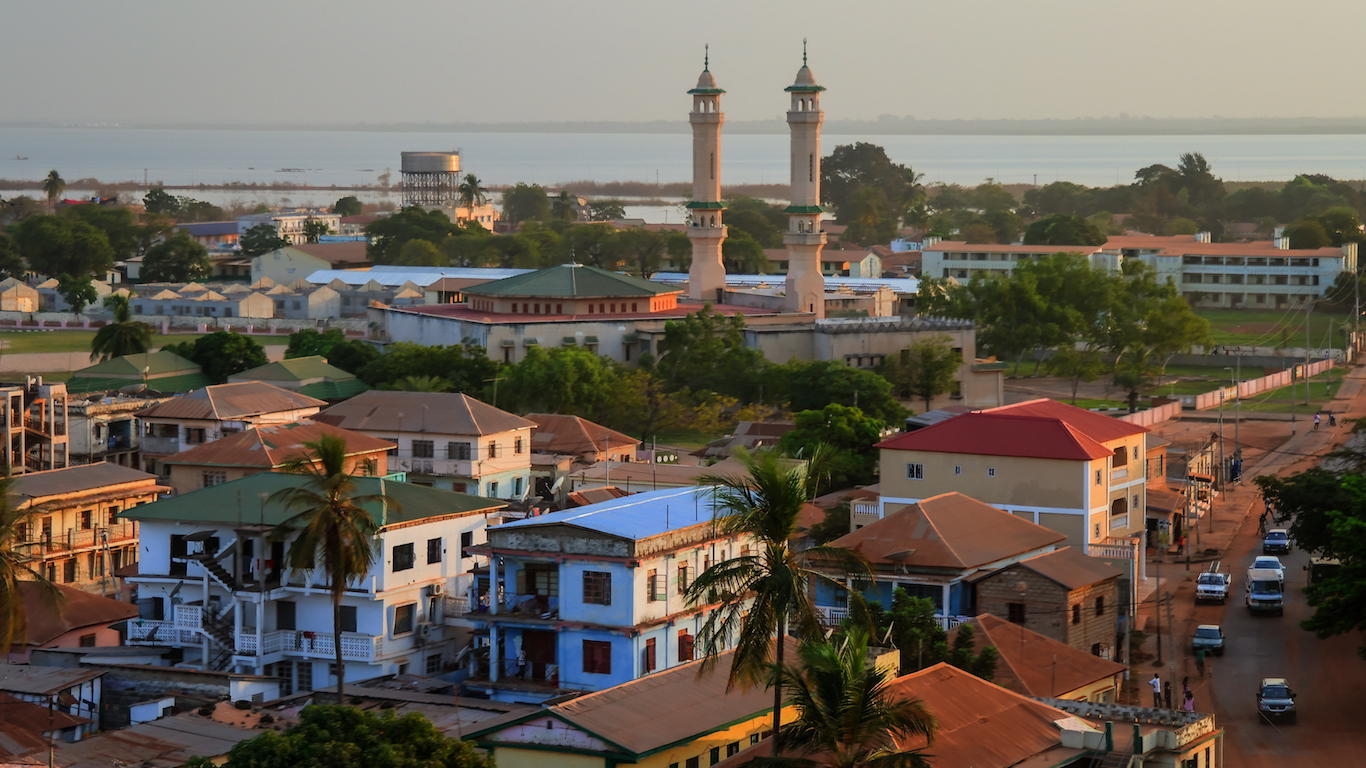
22. The Gambia
> Maximum anti-gay penalty: 14 years in prison
> Population: 2,280,100
> GNI per capita, PPP: $2,570
> Literacy rate (% of people 15 and above): 51%
> Amount of US aid in 2020: $615,854
In the African nation of The Gambia, any person regardless of gender who has same-sex relations can be imprisoned for as many as 14 years.
In 2017, the U.S. State Department reported elevated levels of societal bias against gay people in the country. That same year, then newly elected President Adama Barrow said homosexuality was not an issue in The Gambia. Barrow’s predecessor Yahya Jammeh had called homosexuals vermin and threatened to cut their throat. The European Union withheld more than 33 million euros (about $37 million) in aid in protest over the targeting of the LGBT communities in The Gambia.
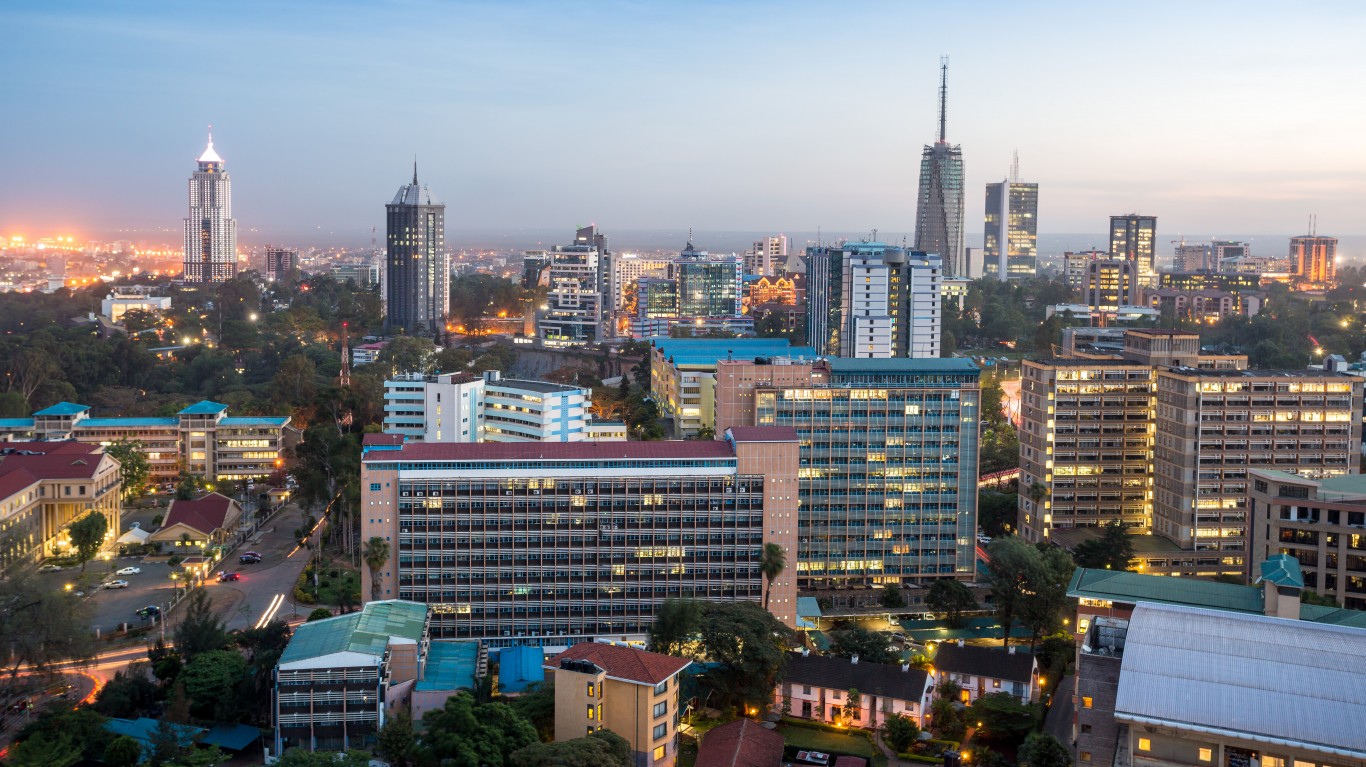
21. Kenya
> Maximum anti-gay penalty: 14 years in prison
> Population: 51,393,010
> GNI per capita, PPP: $3,440
> Literacy rate (% of people 15 and above): 82%
> Amount of US aid in 2020: $109.5 million
Men who engage in same-sex conduct in Kenya face imprisonment of up to 14 years. Until 2018, Kenya forced anal examinations to find “proof” of same-sex sexual acts. Incidents of mob violence against LGBT people and arrests of victims have been reported.
In April 2018, Kenya banned the film “Rafiki” — about a lesbian relationship — claiming it promoted lesbianism. The ban was briefly lifted in September so that the movie could be submitted for international film awards.
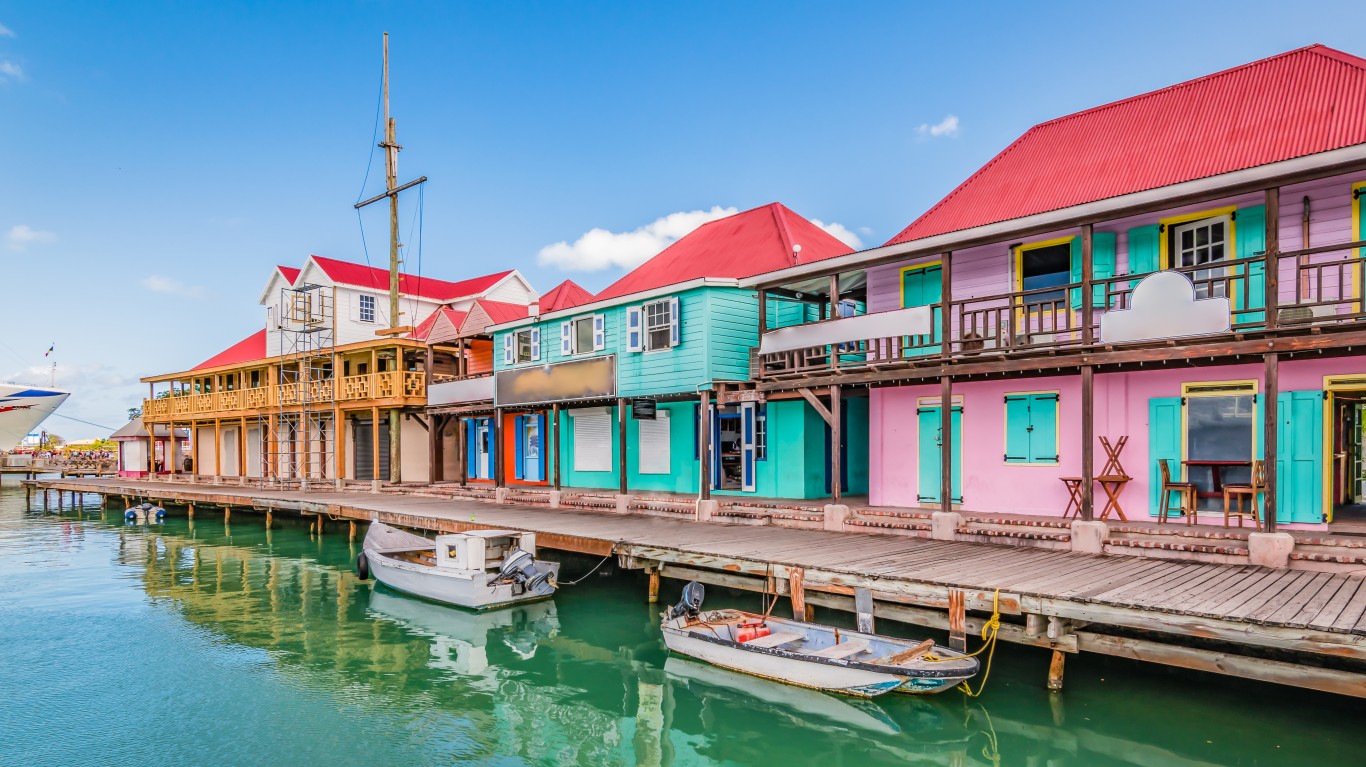
20. Antigua and Barbuda
> Maximum anti-gay penalty: 15 years in prison
> Population: 96,290
> GNI per capita, PPP: $25,490
> Literacy rate (% of people 15 and above): 99%
> Amount of US aid in 2020: 0
Men found guilty of same-sex conduct in Anitgua and Barbuda, an island nation in the West Indies, may be imprisoned for up to 15 years.
The Antiguan Attorney General supported in 2011 so-called buggery laws, stating, “There will be no change in the law on buggery in Antigua and Barbuda, at least not if I can help it. Being gay is morally wrong, and to be honest personally, I am still homophobic.” However, by 2016, the Caribbean nation was moving toward decriminalizing homosexual conduct.
[in-text-ad-2]
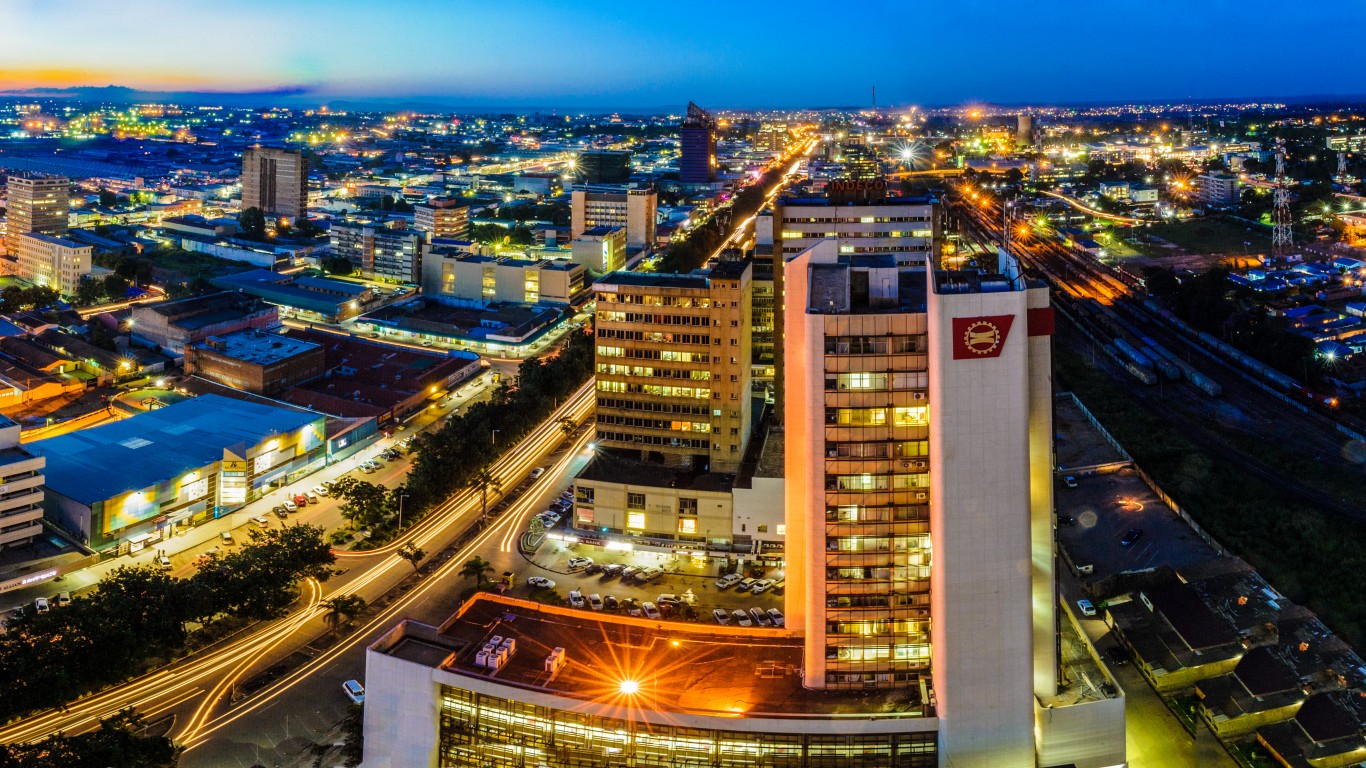
19. Zambia
> Maximum anti-gay penalty: Life in prison
> Population: 17,351,822
> GNI per capita, PPP: $4,100
> Literacy rate (% of people 15 and above): 87%
> Amount of US aid in 2020: $60.1 million
In the African nation of Zambia, any person who engages in same-sex activity regardless of gender can face imprisonment for at least 15 years and up to life.
Anti-gay crackdown occurred in 2013 after four gay couples were rumored to try and register for same-sex marriage. One tribal chief at the time said homosexuals should be “caged.” In 1998, Zambia’s Registrar of Societies refused to register the group Lesbians Gays and Transgender Association (LEGATRA), saying they could not register the group “any more than I could a Satanic organization.”
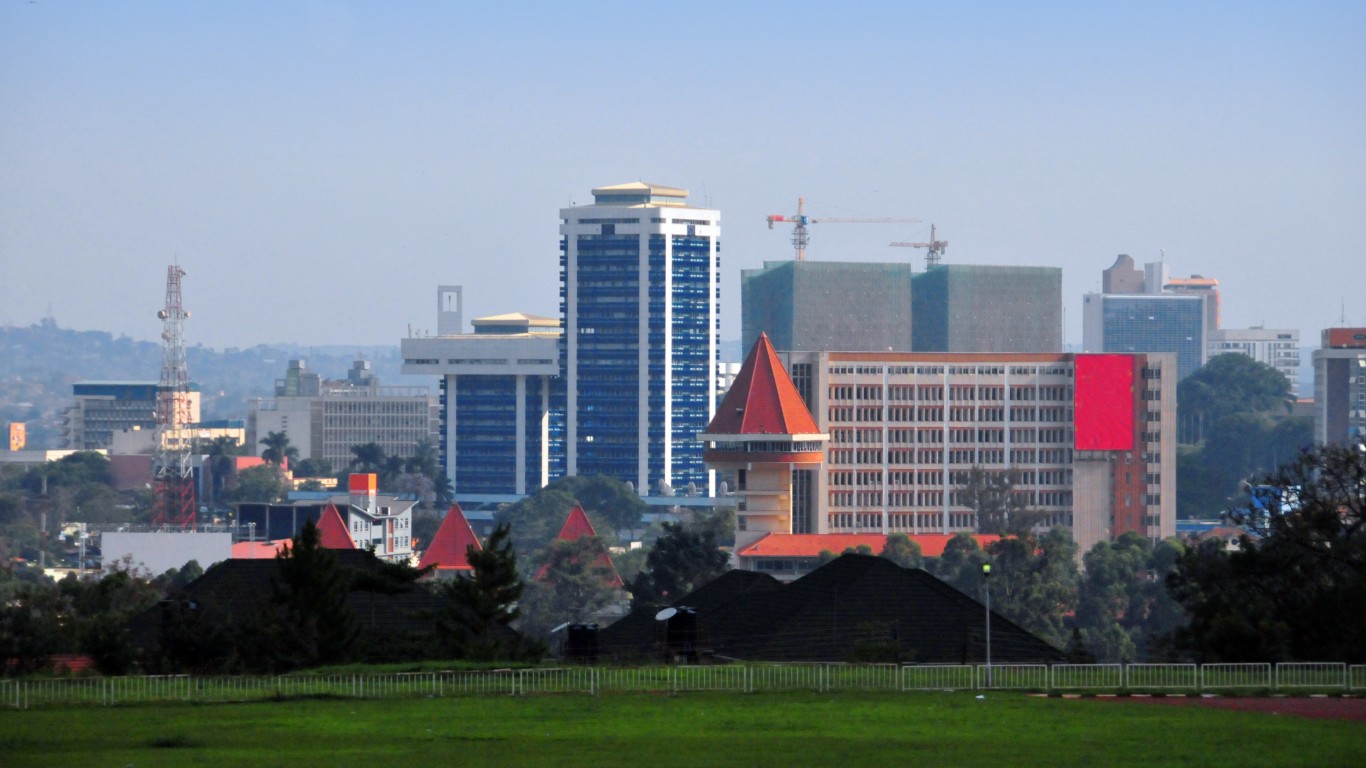
18. Uganda
> Maximum anti-gay penalty: Life in prison
> Population: 42,723,139
> GNI per capita, PPP: $1,970
> Literacy rate (% of people 15 and above): 77%
> Amount of US aid in 2020: $124.4 million
Any person regardless of gender engaging in same-sex activity in Uganda is liable for imprisonment for life. Attacks against LGBT advocacy organizations in the country have forced some of them to shut down temporarily. Officials have opposed events supporting HIV prevention. In 2017, President Yoweri Museveni said, “You cannot stand up here and say ‘I am a homosexual.’ People will not like it.”
[in-text-ad]
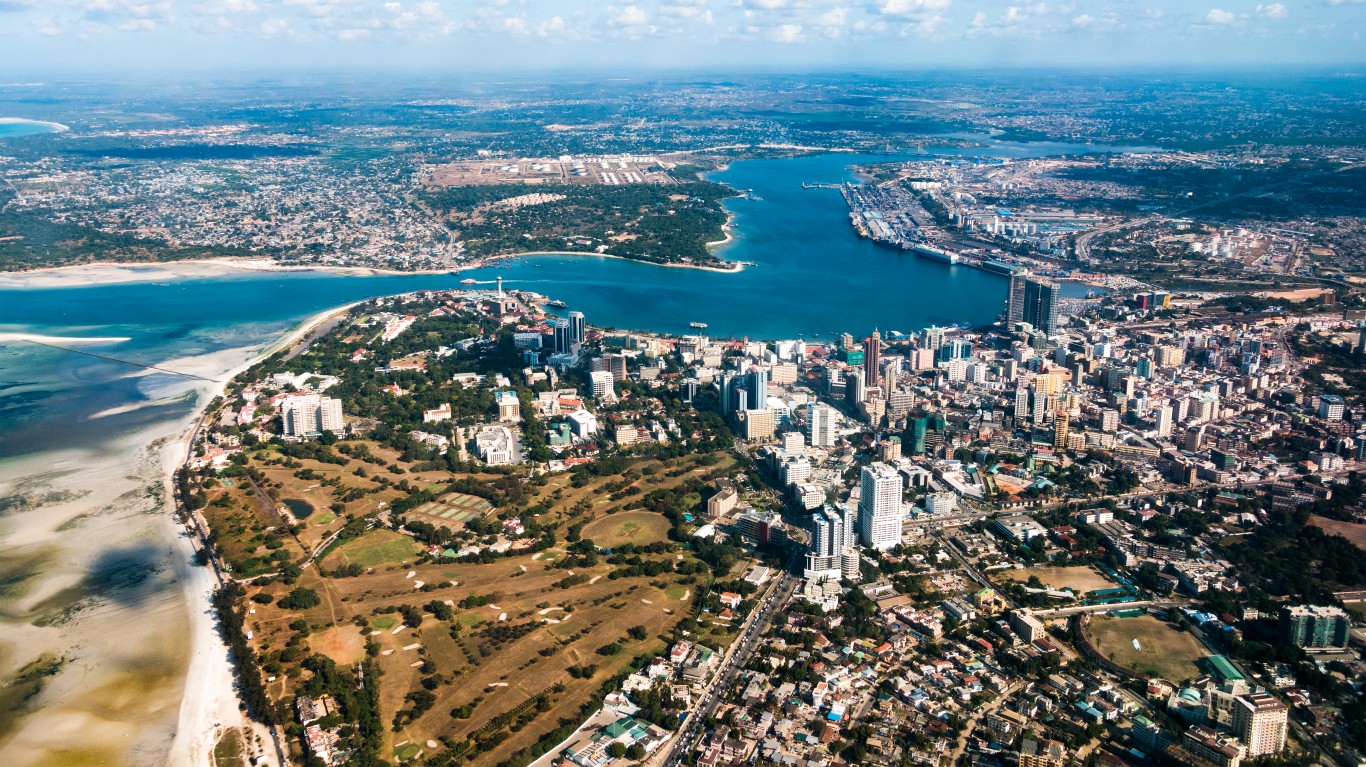
17. Tanzania
> Maximum anti-gay penalty: Life in prison
> Population: 56,318,348
> GNI per capita, PPP: $3,160
> Literacy rate (% of people 15 and above): 78%
> Amount of US aid in 2020: $84.9 million
In Tanzania, one of the most populous nations in Africa, any person, regardless of gender, faces at least 30 years in prison and up to life in prison for engaging in same-sex conduct. An article in the nation’s penal code says materials tending to “corrupt morals” may not be distributed, sold, or shown.
Respect for the rights of LGBT people has declined in recent years. In mid-2016, the government launched a crackdown on LGBT communities that has been escalating ever since. In 2017, Deputy Health Minister Hamisi Kigwangalla banned private health care centers that provided HIV-related services, saying they promoted homosexuality.
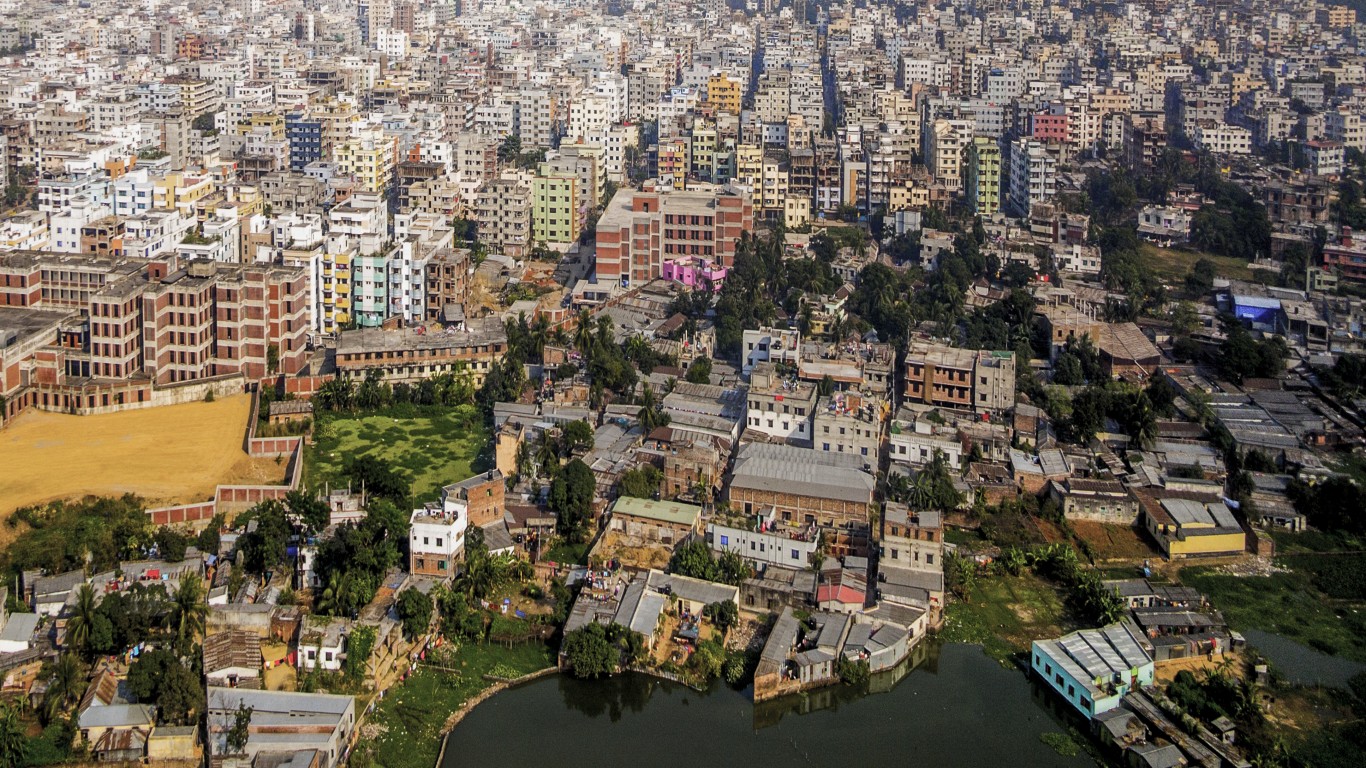
16. Bangladesh
> Maximum anti-gay penalty: Life in prison
> Population: 161,356,039
> GNI per capita, PPP: $4,570
> Literacy rate (% of people 15 and above): 74%
> Amount of US aid in 2020: $68.9 million
In the Asian nation of Bangladesh, people who are involved in same-sex conduct can face prison terms for life.
There are reports from Bangladesh about threats of violence from religious radicals, and LGBT people have said the nation has not offered protection. Activists say intolerance and violence against LGBT people have risen in Bangladesh, with gay people afraid of associating with one another.
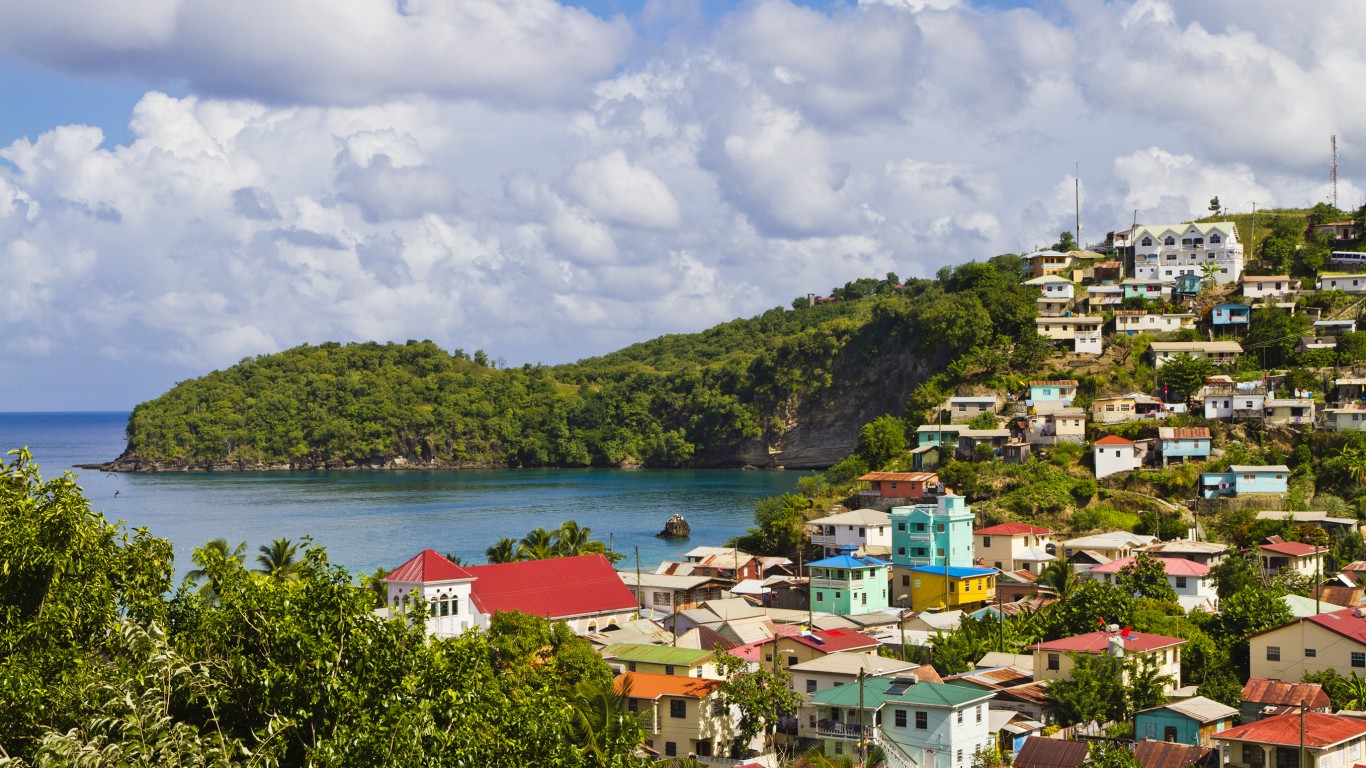
15. St. Lucia
> Maximum anti-gay penalty: Life in prison
> Population: 181,890
> GNI per capita, PPP: $12,990
> Literacy rate (% of people 15 and above): N/A
> Amount of US aid in 2020: 0
On St. Lucia, an island nation in the eastern Caribbean, men convicted of same-sex conduct may be liable to imprisonment for life if commited by rape, and 10 years in other cases.
The country’s first LGBT human rights office was burned to the ground in 2011. That same year, three gay American tourists were attacked in what was described as a hate crime. As for citizens of St. Lucia, they tend to underreport crimes against LGBT people because of police apathy. There are also reports of bias against LGBT people in terms of renting homes and harassment in the workplace.
[in-text-ad-2]
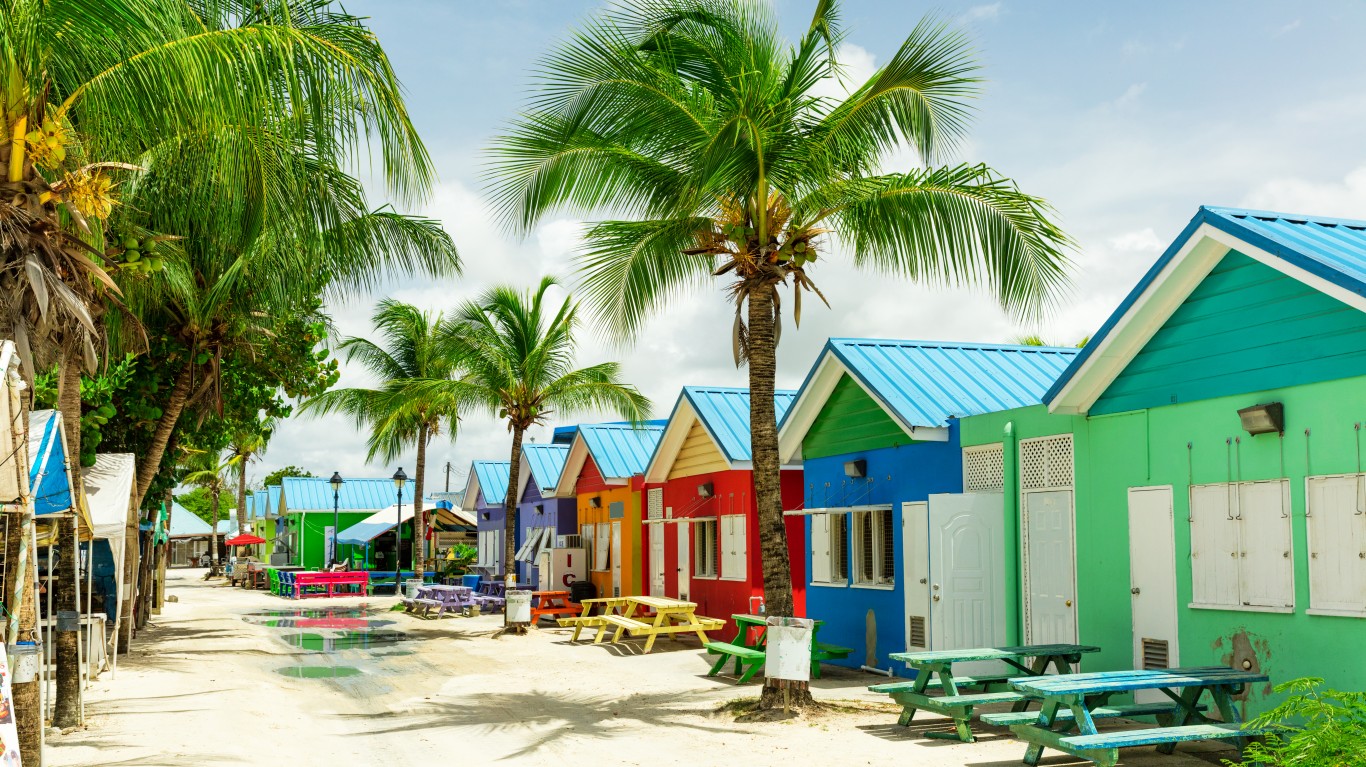
14. Barbados
> Maximum anti-gay penalty: Life in prison
> Population: 286,640
> GNI per capita, PPP: $16,280
> Literacy rate (% of people 15 and above): 100%
> Amount of US aid in 2020: $95,080
The penalty in Barbados, an island in the eastern Caribbean, for a person of any gender engaging in same-sex acts for life in prison.
Barbados has held gay pride parades and other events, and there have been calls to accept gay relationships as part of the island country’s culture. Even so, some political figures remain opposed to changing the law. In May 2017, Minister of the Environment Denis Lowe said he did not support the LGBT movement in Barbados and would not back the legislation of same-sex marriage because he still believed in “the biblical way of life.”
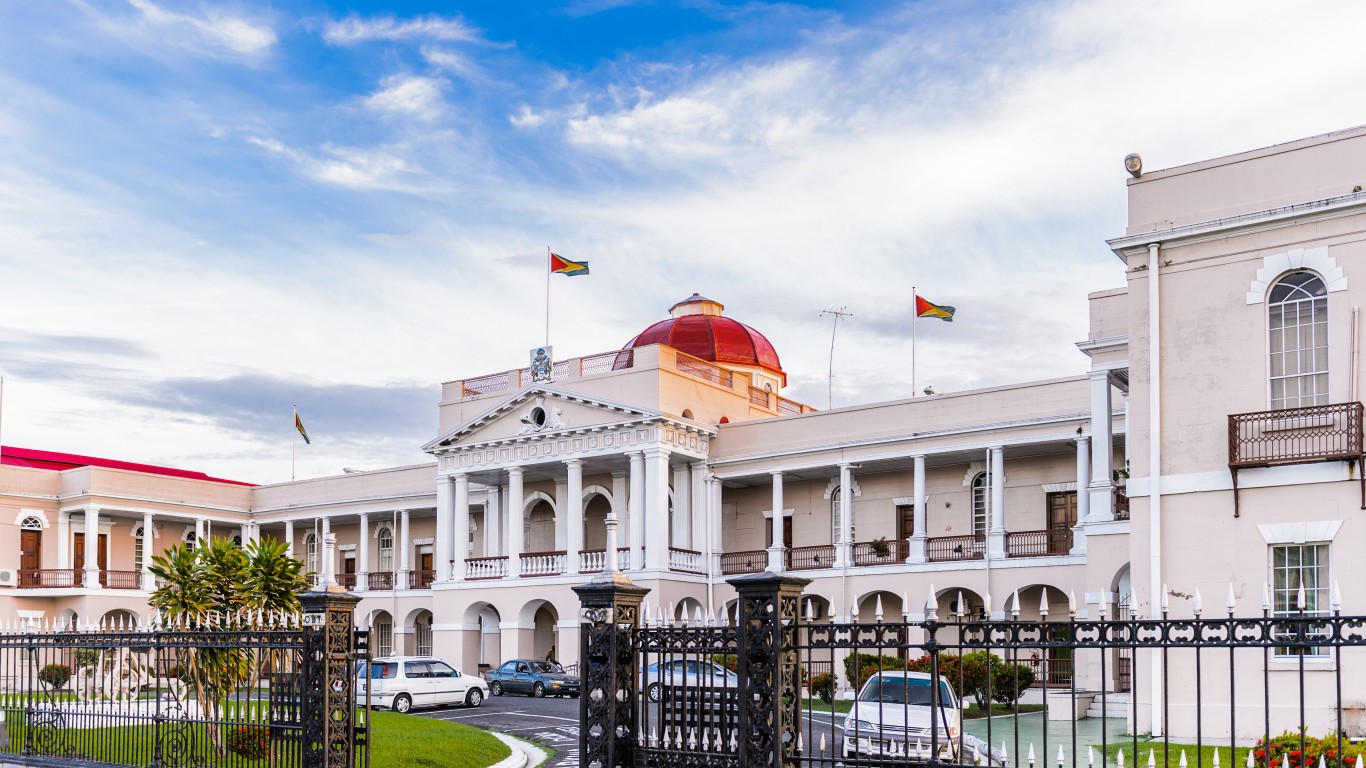
13. Guyana
> Maximum anti-gay penalty: Life in prison
> Population: 779,000
> GNI per capita, PPP: $8,420
> Literacy rate (% of people 15 and above): 86%
> Amount of US aid in 2020: $604,617
The penalty in Guyana, a country on South America’s North Atlantic coast, for same-sex conduct can be life in prison.
In 2018, religious leaders called on the government to oppose gay pride parades and festivals. Guyana had planned to hold a referendum on whether homosexuality should remain criminalized in 2017 but called it off. LGBT groups opposed the referendum saying it would stoke homophobia.
[in-text-ad]
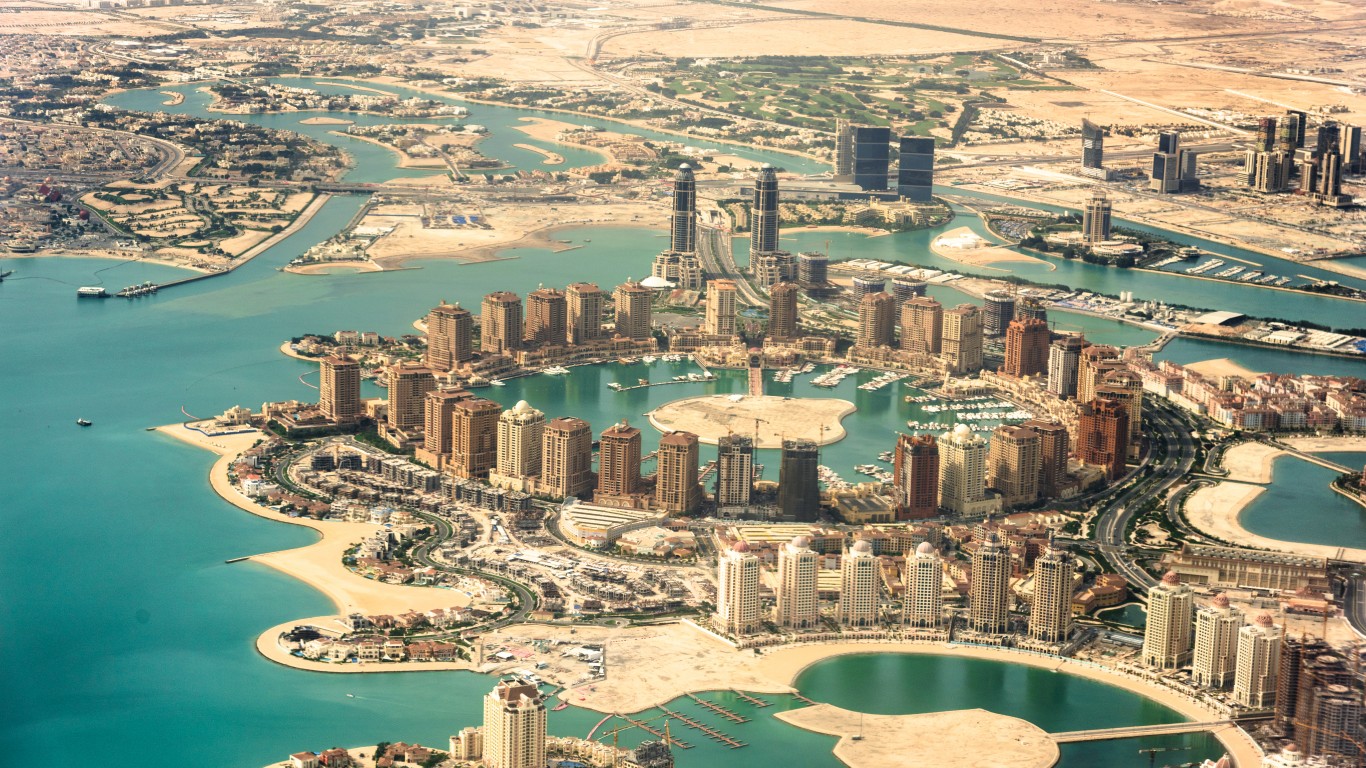
12. Qatar
> Maximum anti-gay penalty: Death
> Population: 2,781,677
> GNI per capita, PPP: $124,401
> Literacy rate (% of people 15 and above): 93%
> Amount of US aid in 2020: $4,328
Same-sex relations are illegal in Qatar. Men face up to seven years in prison. Muslims in the country may face the death penalty, based on the interpretation of Sharia law, if they are engaging in extramarital sex, regardless of whether the affair is between men, women, or a man and a woman.
Qatar will host the 2022 World Cup soccer tournament and has come under greater scrutiny for its treatment of LGBT communities.
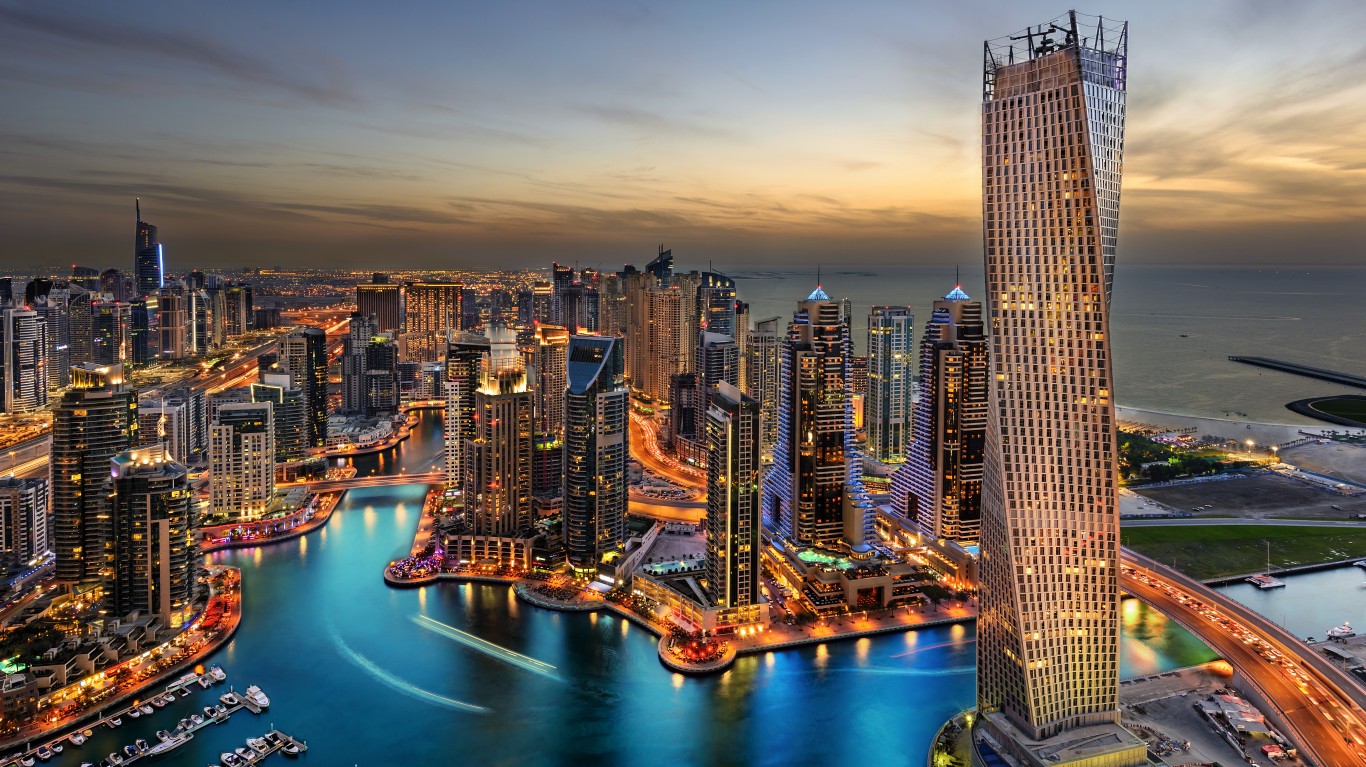
11. United Arab Emirates
> Maximum anti-gay penalty: Death
> Population: 9,630,959
> GNI per capita, PPP: $75,440
> Literacy rate (% of people 15 and above): 93%
> Amount of US aid in 2020: $72,236
All sex outside of heterosexual marriage is illegal and those convicted can be imprisoned for up to a year. The penal code is not explicitly clear about homosexuality being a capital crime or not. The legal language can be interpreted as making all male homosexual intercourse a capital crime, but it can also mean that only for rape. Consensual homosexual relations are punishable in several ways, including hanging. There is no record of consensual homosexual acts being punished by anything but jail terms of differing lengths and fines.
It is through the Sharia code that the death penalty theoretically can be applied to same-sex sexual relations through the offense of Zina, which refers to any sexual acts by a married person outside of marriage.
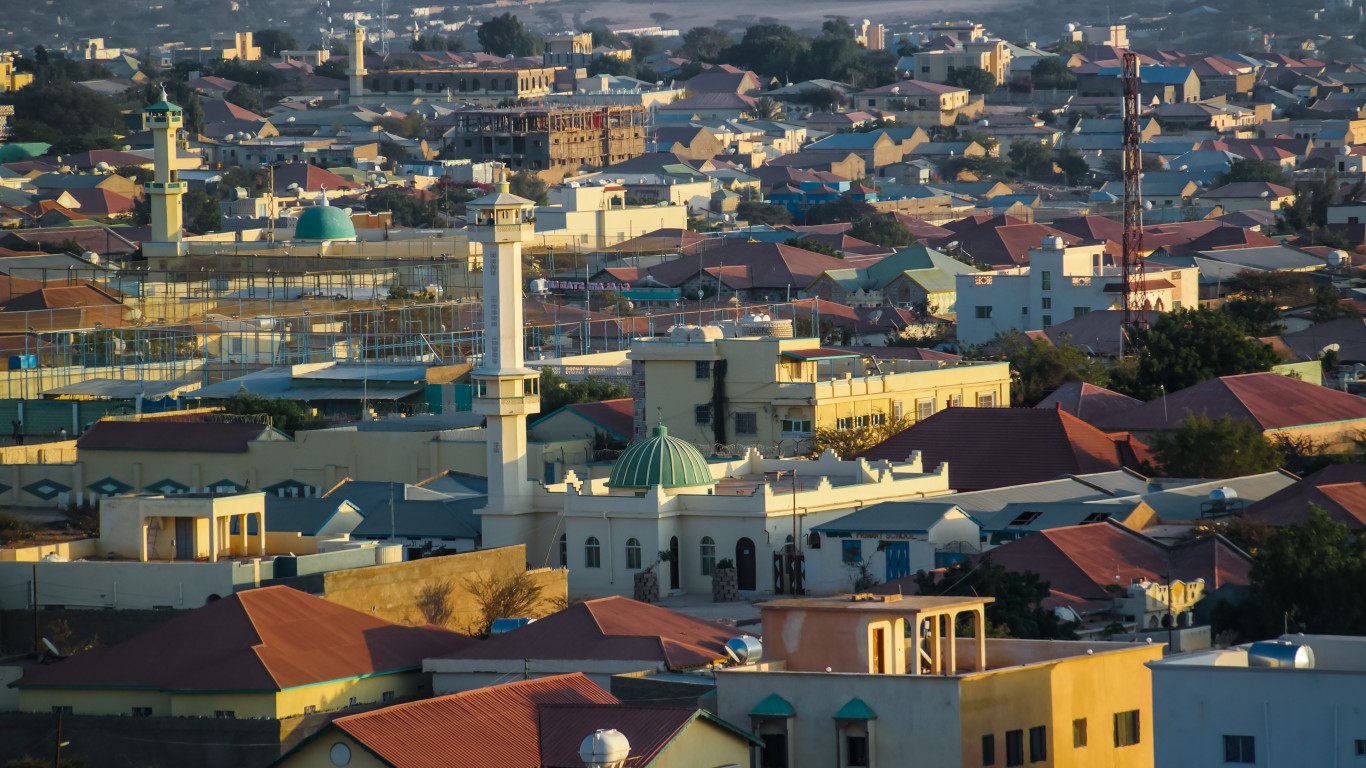
10. Somalia
> Maximum anti-gay penalty: Death
> Population: 15,008,54
> GNI per capita, PPP: N/A
> Literacy rate (% of people 15 and above): 5%
> Amount of US aid in 2020: $120.6 million
Intercourse between people of the same sex is illegal in Somalia, an eastern African nation that has been in chaos since 1991. Such acts can result in prison terms from three months to three years. The punishment for other gay activities, defined as “acts of lust,” is also imprisonment of between two months and two years. In 2012, a newly adopted provisional constitution made Somalia’s interpretation of Sharia law the main law of the country, making homosexuality a crime that can be punished by flogging or death.
A U.N. Human Rights Council report in 2015 said the death penalty has been used in parts of the country.
[in-text-ad-2]
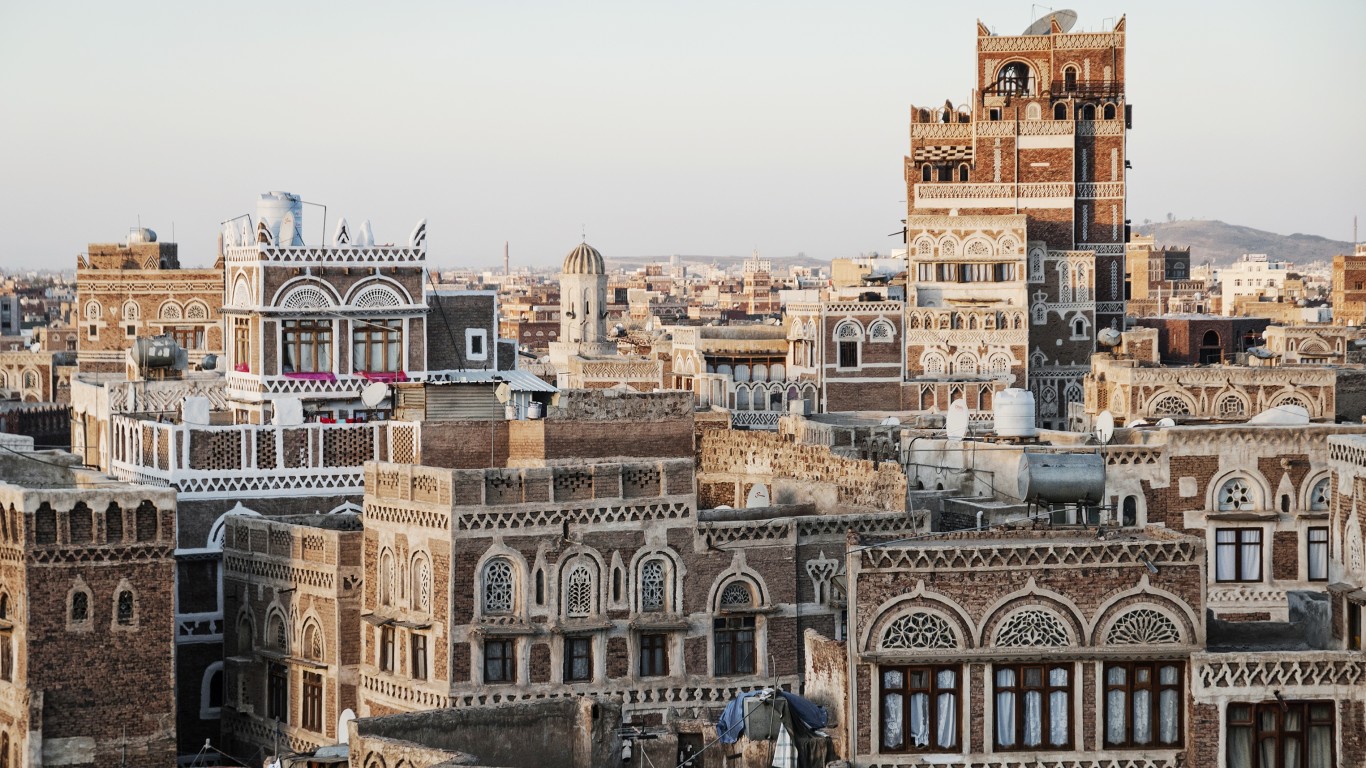
9. Yemen
> Maximum anti-gay penalty: Death
> Population: 28,498,687
> GNI per capita, PPP: N/A
> Literacy rate (% of people 15 and above): 54%
> Amount of US aid in 2020: $109.3 million
In Yemen, the law states that unmarried gay men are to be punished with 100 whip lashes or one year in prison, but married gay men face death by stoning. Gay women are to be imprisoned for up to three years.
Before the civil war in Yemen, the LGBT community faced hostility in the country on the Arabian Peninsula. The situation has worsened since the war erupted. Yemen has become a more dangerous place for same-sex partners since the Houthi militia seized much of the country in 2013. There have been reports of militants from the Al Qaida-affiliated group Ansar Al Shari shooting or wounding gay men.
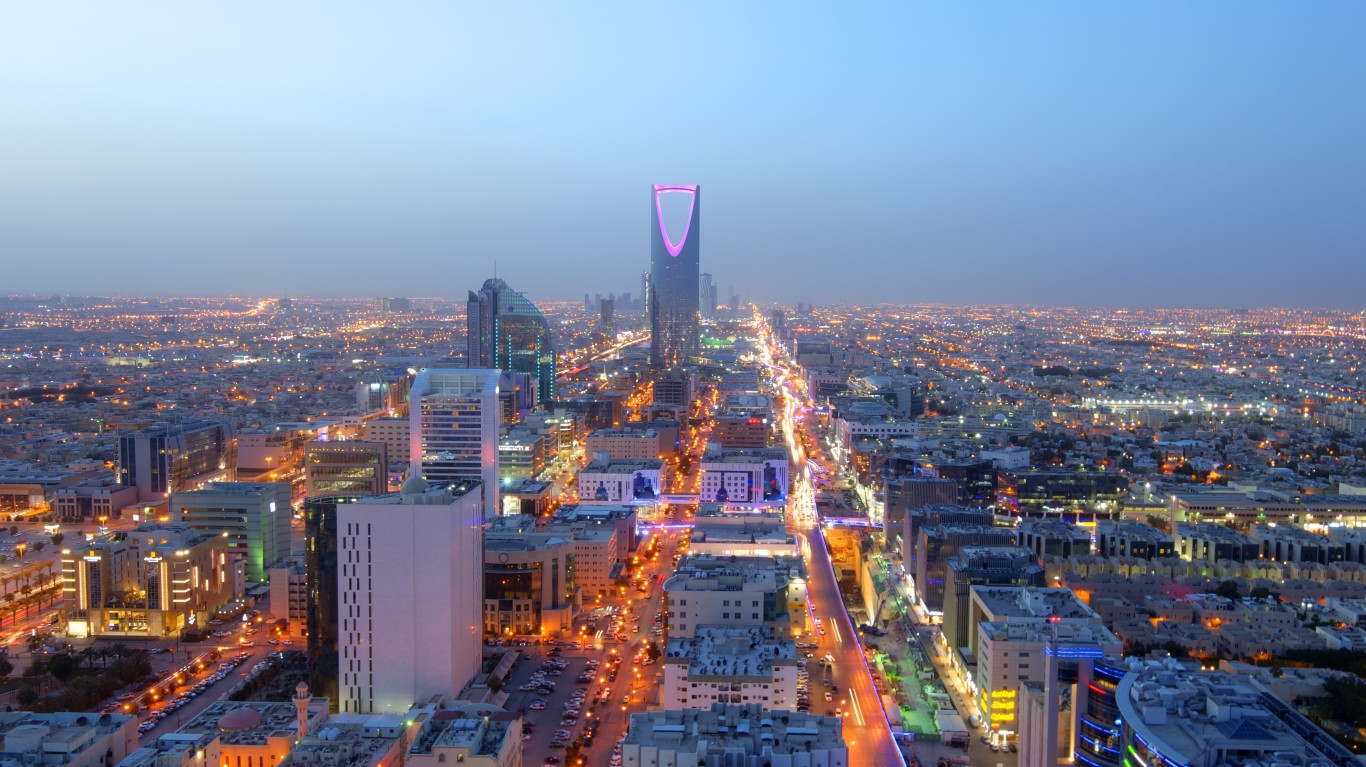
8. Saudi Arabia
> Maximum anti-gay penalty: Death
> Population: 33,699,947
> GNI per capita, PPP: $55,840
> Literacy rate (% of people 15 and above): 95%
> Amount of US aid in 2020: $18,505
Relations between people of the same sex — whether men or women — can be tried as capital crimes in Saudi Arabia. The punishment can also be flogging, but that depends on the perceived seriousness of the wrongdoing. The sentence for first-time offenders is often lashing or some prison time, while those caught more than once can be executed.
There are no LGBT groups or organizations operating in Saudi Arabia, and opportunities for people to meet are limited. Gay people are also persecuted for their identities. In January 2018, Saudi police arrested a group of men who had uploaded a video of a “gay wedding.”
[in-text-ad]
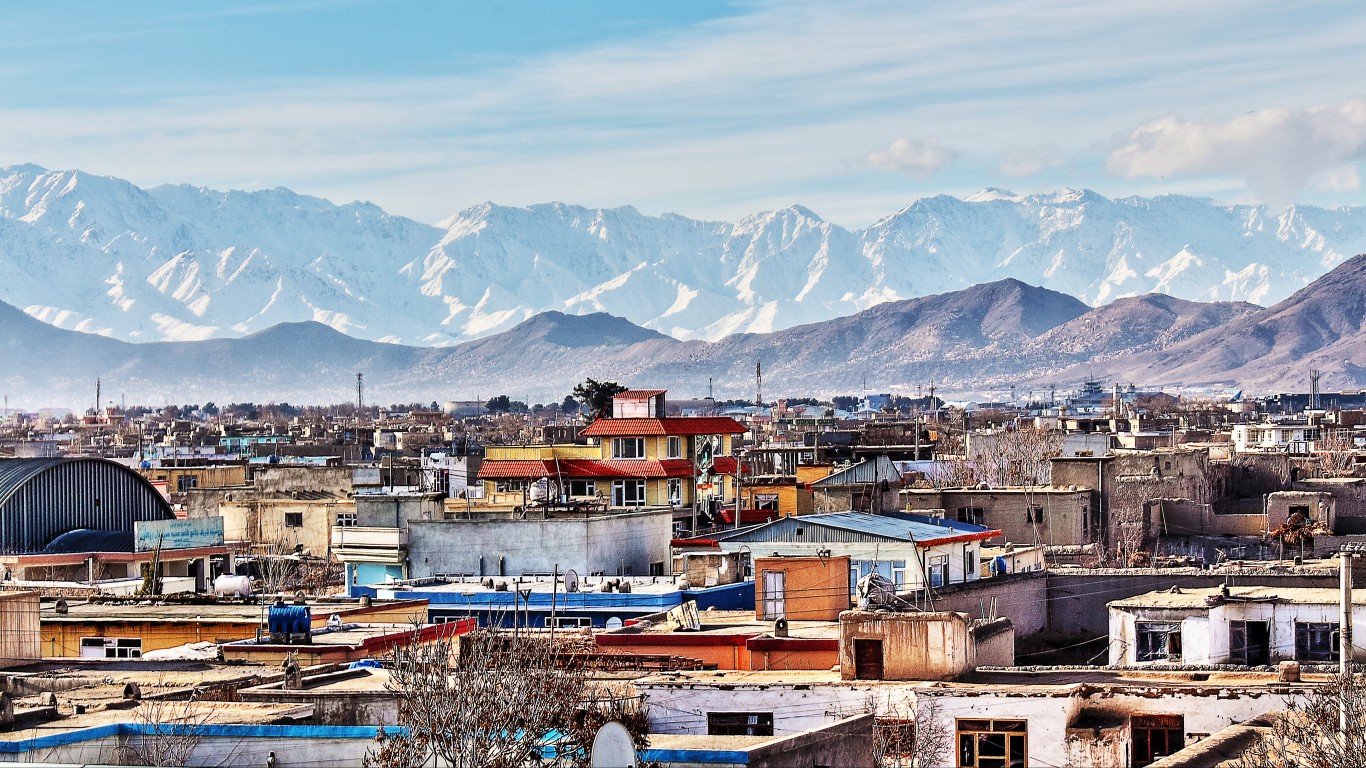
7. Afghanistan
> Maximum anti-gay penalty: Death
> Population: 37,172,386
> GNI per capita, PPP: $1,970
> Literacy rate (% of people 15 and above): 43%
> Amount of US aid in 2020: $391.1 million
Same-sex relationships are not recognized in Afghanistan, one of several United Nations membr states where the possible punishment for same-sex conduct is death. Gay men and women live in fear. The subject of homosexuality is a taboo. It’s almost never talked about and it is perceived as immoral, un-Islamic, and even as a disease.
Honor killings, where relatives kill the gay man or woman to restore the family’s honor, are not unheard of. These laws are more likely to be enforced in Taliban-controlled, rural, and/or isolated communities. A BBC report said one influential Islamic scholar has said that “there was broad consensus amongst scholars that execution was the appropriate punishment if homosexual acts could be proven.”
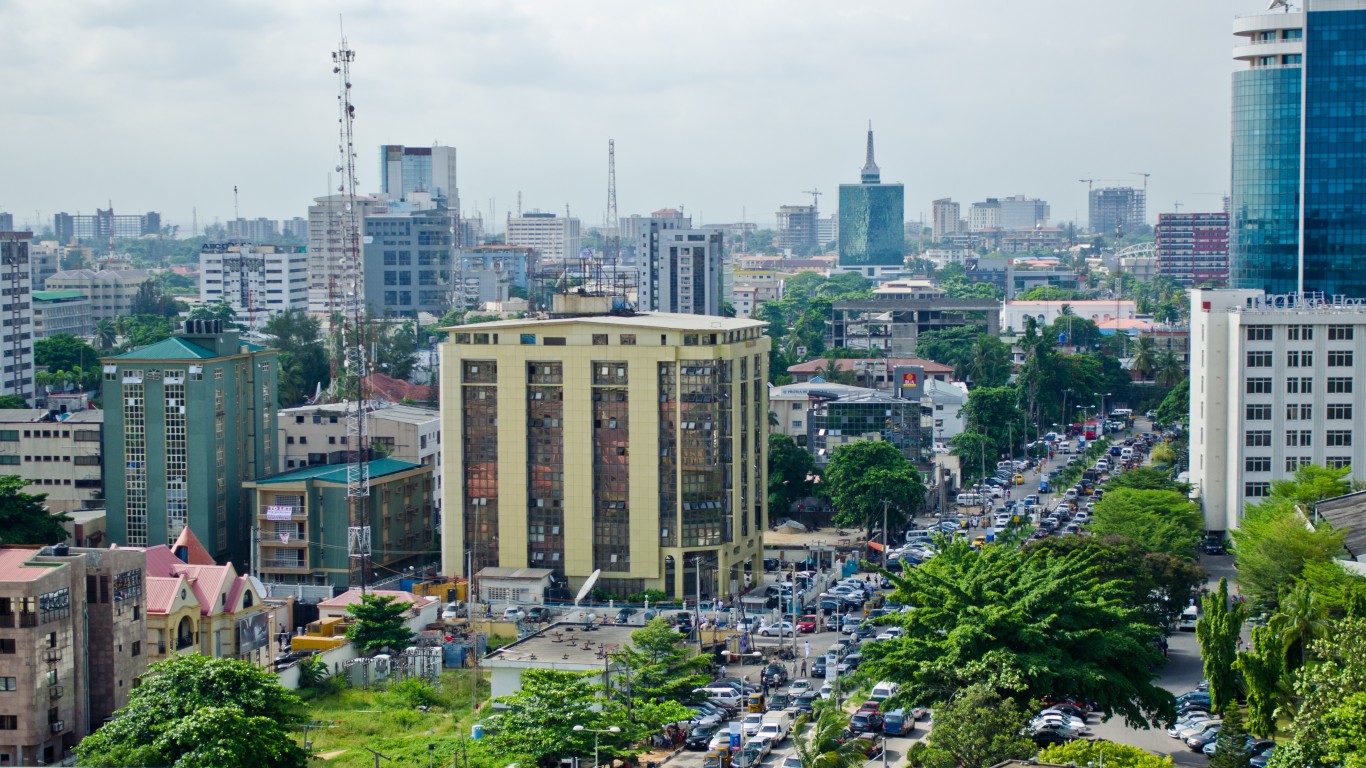
6. Nigeria
> Maximum anti-gay penalty: Death
> Population: 195,874,740
> GNI per capita, PPP: $5,710
> Literacy rate (% of people 15 and above): 62%
> Amount of US aid in 2020: $178.2 million
In 2014, Nigeria’s then President Goodluck Jonathan signed the Same Sex Marriage [Prohibition] Act. Besides banning gay marriage, the act also forbids the registration of gay clubs, societies, and other organizations supporting the LGBT community. Public displays of affection between gay people are also prohibited. Those of any gender found guilty of homosexuality in Nigeria, Africa’s most populous nation, can be put in prison for up to 14 years. While this law is applied across the entire country, 12 northern states have their own laws, punishing gay men and women with death by stoning.
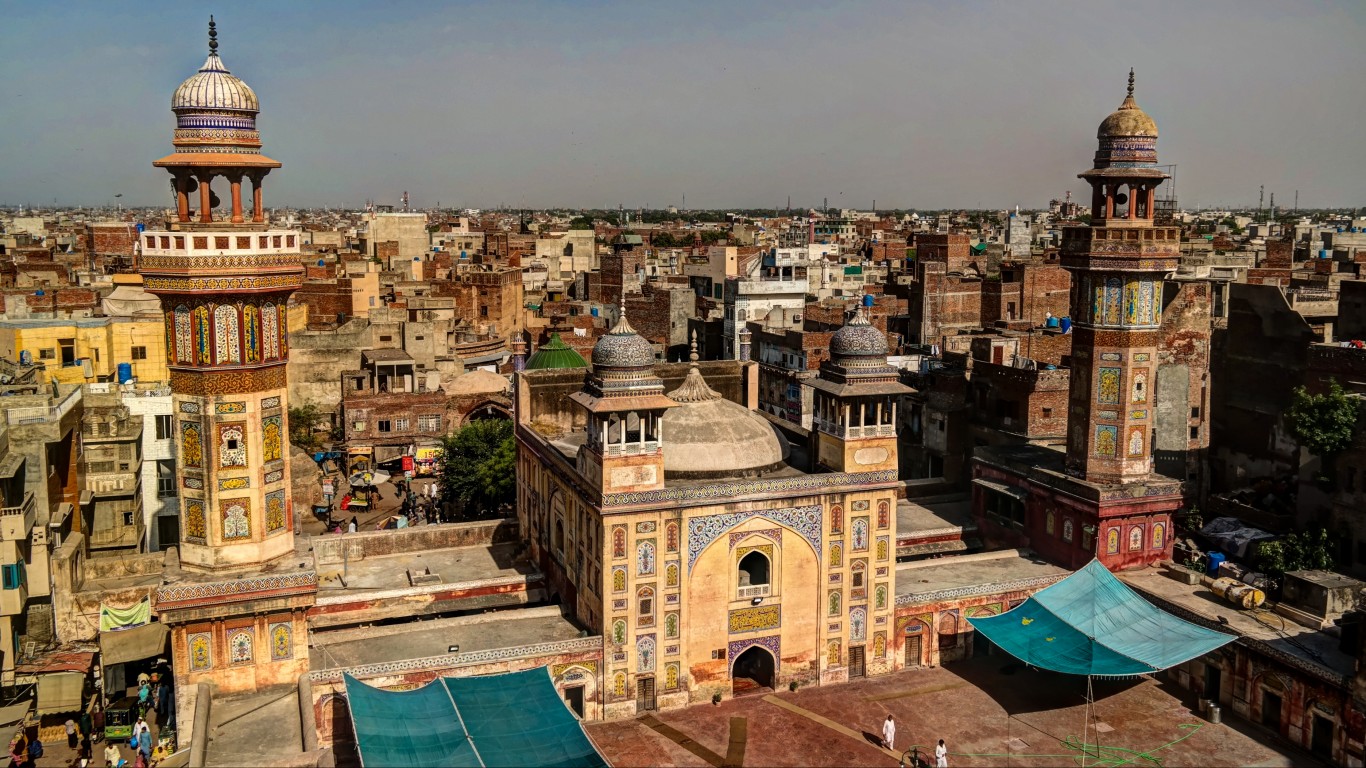
5. Pakistan
> Maximum anti-gay penalty: Death
> Population: 212,215,030
> GNI per capita, PPP: $5,860
> Literacy rate (% of people 15 and above): 59%
> Amount of US aid in 2020: $71.9 million
LGBT issues in Pakistan are a forbidden topic, and homosexual acts are illegal. The country’s penal code does not explicitly state homosexual acts but states that “carnal intercourse against the order of nature” is punishable by a fine and/or imprisonment. The death penalty is technically permitted by the law, but not applied.
Gay people in Pakistan report facing hostility in Pakistani society if they reveal their sexual orientation. Individuals sometimes face pressure and violence from family members to conform to heteronormative expectations of marriage. In September 2013, the Pakistan Telecommunications Authority blocked a site created to help Pakistan’s gay and transgender community to socialize. A spokesperson for the authority said the site was shut down because “its content was against Islam and norms of Pakistani society.”
[in-text-ad-2]
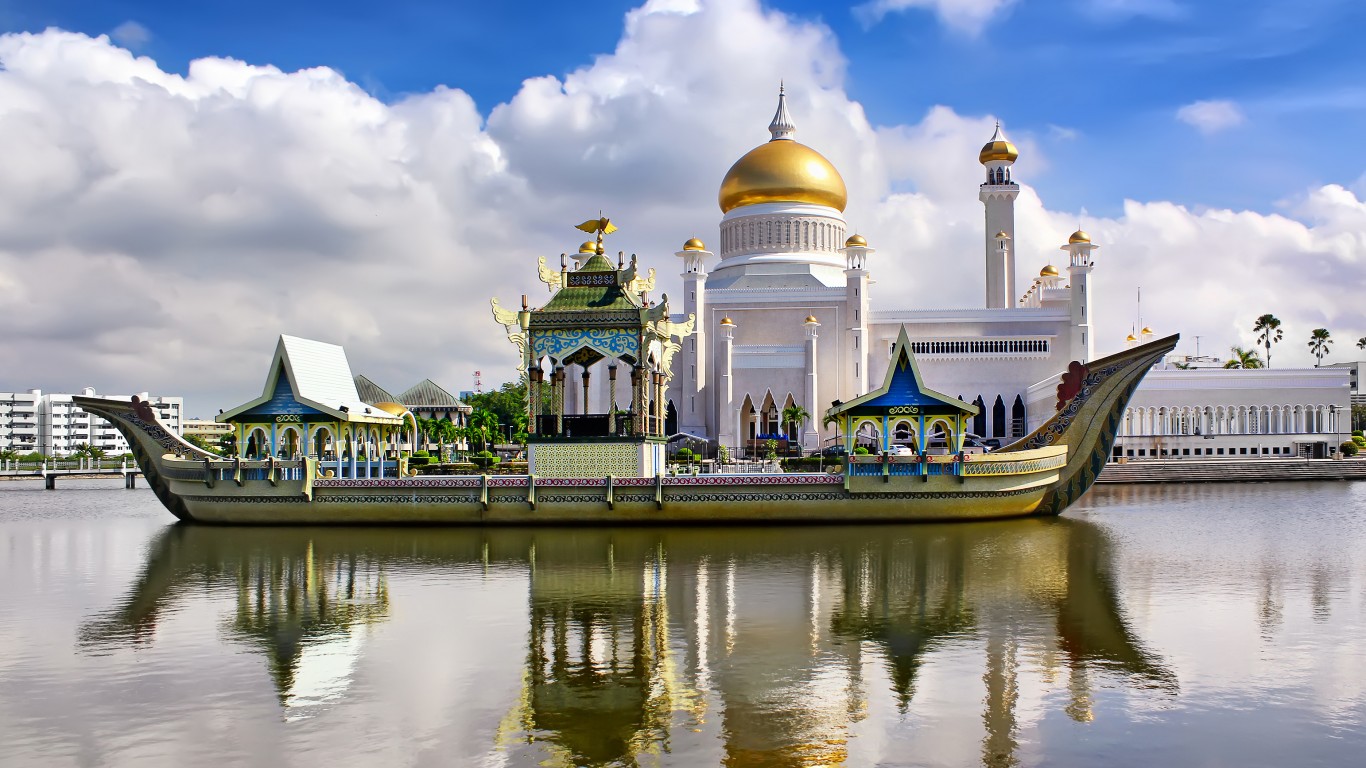
4. Brunei Darussalam
> Maximum anti-gay penalty: Death
> Population: 428,960
> GNI per capita, PPP: $82,180
> Literacy rate (% of people 15 and above): 97%
> Amount of US aid in 2020: 0
The Brunei Islamic Religious Council in 2018 approved the Criminal Procedures Code on Syariah, which would impose the death penalty on male same-sex sexual acts. The standard of proof under the Sharia law requires four male witnesses that were present when the acts in question took place before there is a conviction. The enactment of the laws in the Asian nation was met by international outrage. After several weeks of condemnation by world leaders, the sultanate announced it wouldn’t enforce the death penalty for people engaging in homosexual acts.
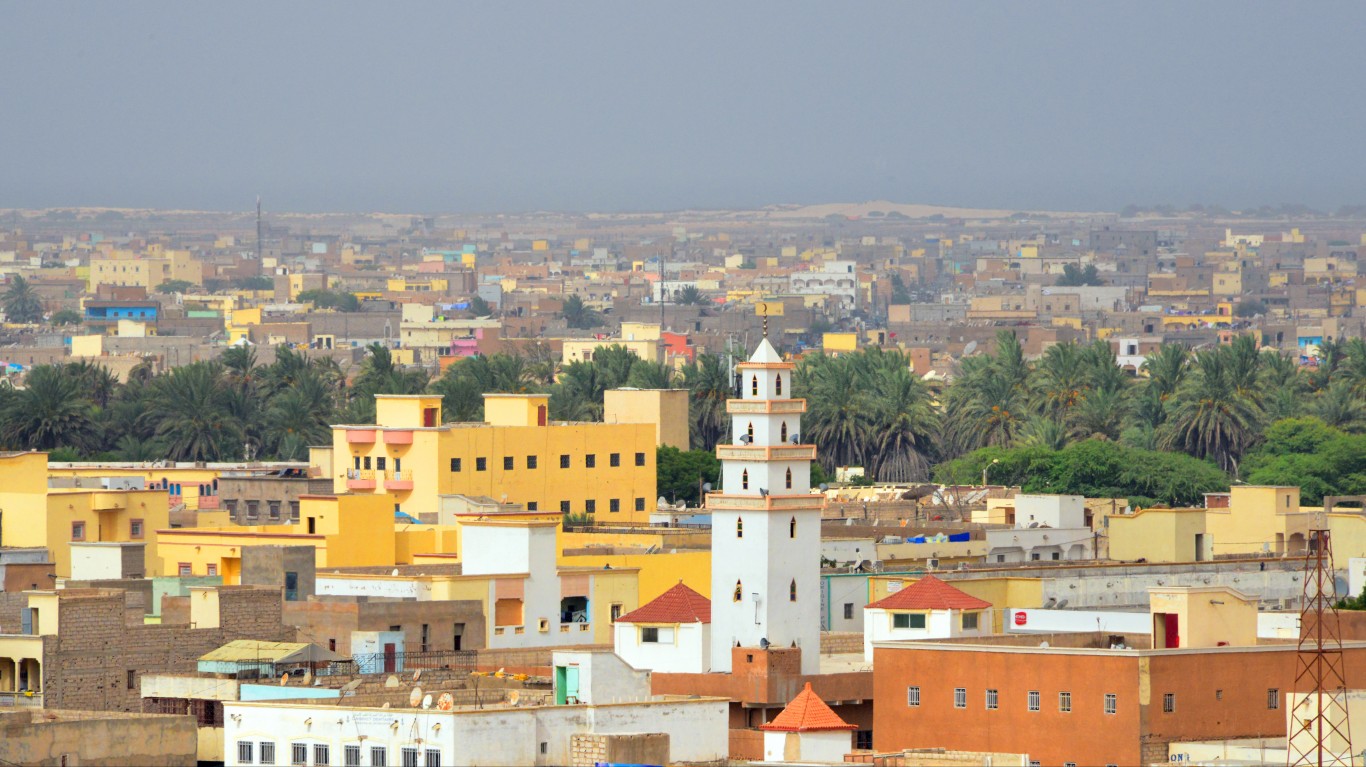
3. Mauritania
> Maximum anti-gay penalty: Death
> Population: 4,403,320
> GNI per capita, PPP: $4,120
> Literacy rate (% of people 15 and above): 53%
> Amount of US aid in 2020: $3.56 million
Homosexuality regardless of gender has always been illegal in Mauritania, the 11th-largest country in Africa by area. Female offenders can be sentenced to two years in prison and paying a fine. For men, homosexuality is a capital crime — and the method of execution is stoning. Mauritania has observed a moratorium on stoning since 1987. A Human Rights Watch study in 2018 found that LGBT people deal with “routine violence and discrimination in almost all aspects of their daily lives” in Mauritania, such as police abuse and arbitrary detention.
[in-text-ad]
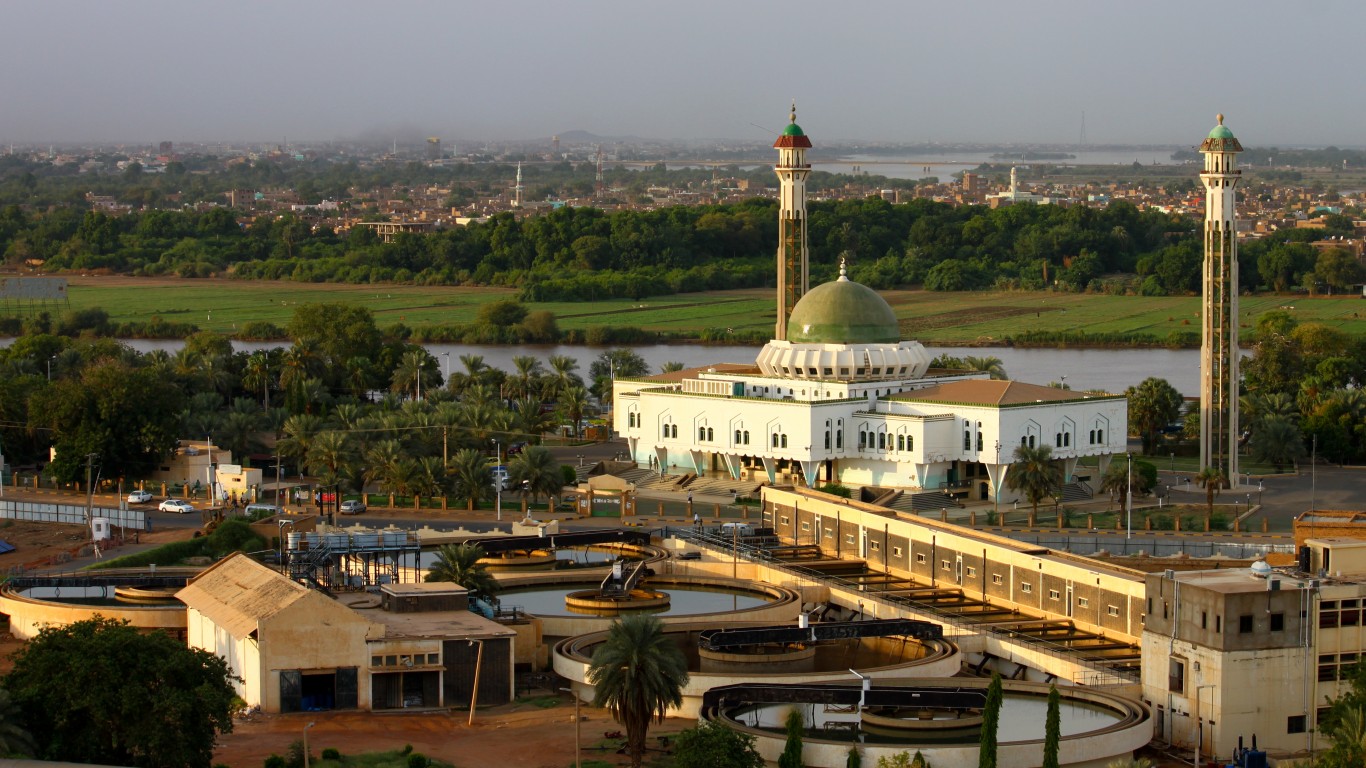
2. Sudan
> Maximum anti-gay penalty: Death
> Population: 41,801,530
> GNI per capita, PPP: $4,420
> Literacy rate (% of people 15 and above): 61%
> Amount of US aid in 2020: $42.9 million
Relationships between men are illegal in Sudan (the law is not clear about those between women). The punishment for a third conviction is death or life in prison. Acts that are not sodomy but deemed indecent by authorities are punishable by 40 lashes and possible prison time for up to a year. In Sudan, sexual behavior is linked to the concept of honor, which results in honor killings and hostility towards any public discussion of homosexuality.
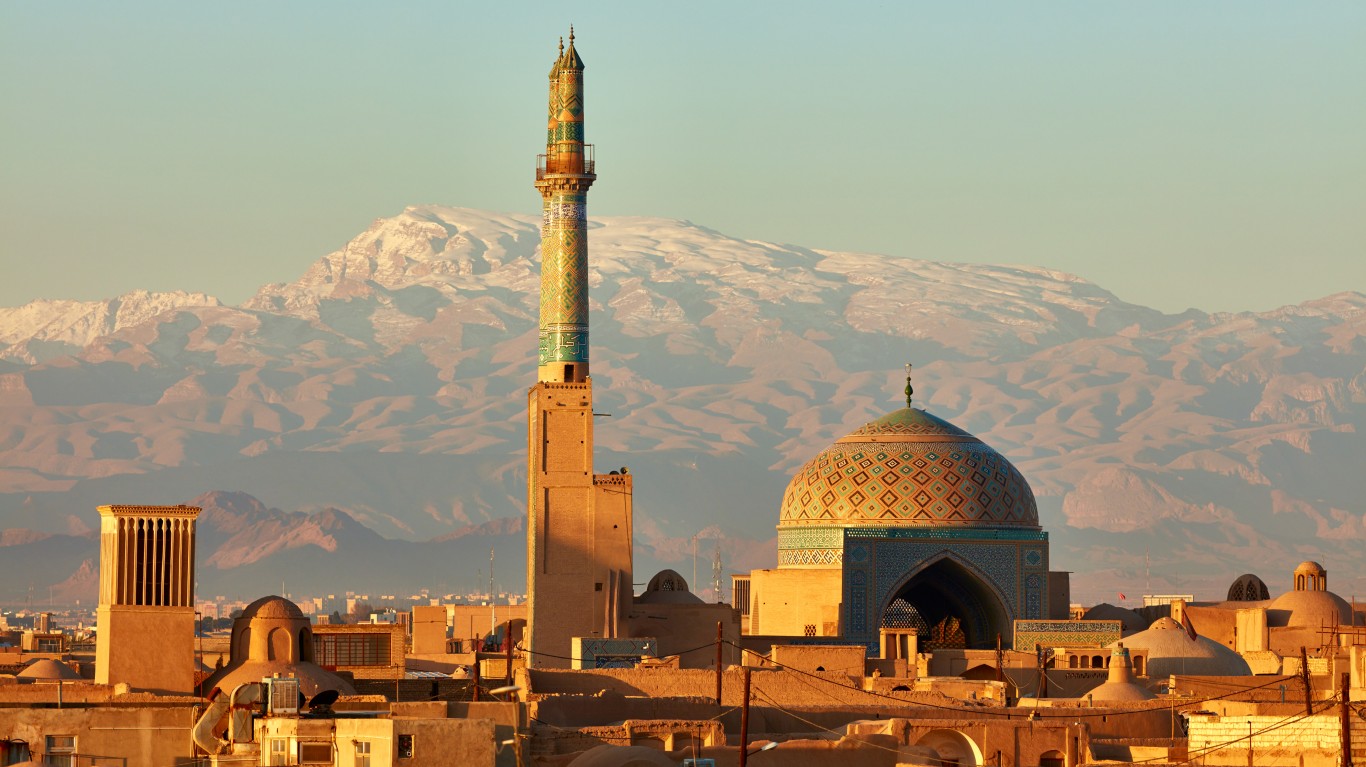
1. Iran
> Maximum anti-gay penalty: Death
> Population: 81,800,270
> GNI per capita, PPP: $21,050
> Literacy rate (% of people 15 and above): 86%
> Amount of US aid in 2020: 0
Homosexulaty was made a crime punishable by death in 1979, after the Islamic revolution. There have been reports over the last six years of gay men who have been hanged in Iran. Health care workers in the country reportedly tell gay and lesbian patients that their same-sex attraction is an indication of a so-called gender identity disorder that must be treated with “reparative” therapies or sex reassignment surgeries. Many of these are performed without consent.
In March 2012, Mehrdad Bazrpash, a former deputy president of the country, said, “It’s a great honor to violate homosexuals rights.”
Essential Tips for Investing (Sponsored)
A financial advisor can help you understand the advantages and disadvantages of investment properties. Finding a qualified financial advisor doesn’t have to be hard. SmartAsset’s free tool matches you with up to three financial advisors who serve your area, and you can interview your advisor matches at no cost to decide which one is right for you. If you’re ready to find an advisor who can help you achieve your financial goals, get started now.
Investing in real estate can diversify your portfolio. But expanding your horizons may add additional costs. If you’re an investor looking to minimize expenses, consider checking out online brokerages. They often offer low investment fees, helping you maximize your profit.
Thank you for reading! Have some feedback for us?
Contact the 24/7 Wall St. editorial team.
 24/7 Wall St.
24/7 Wall St.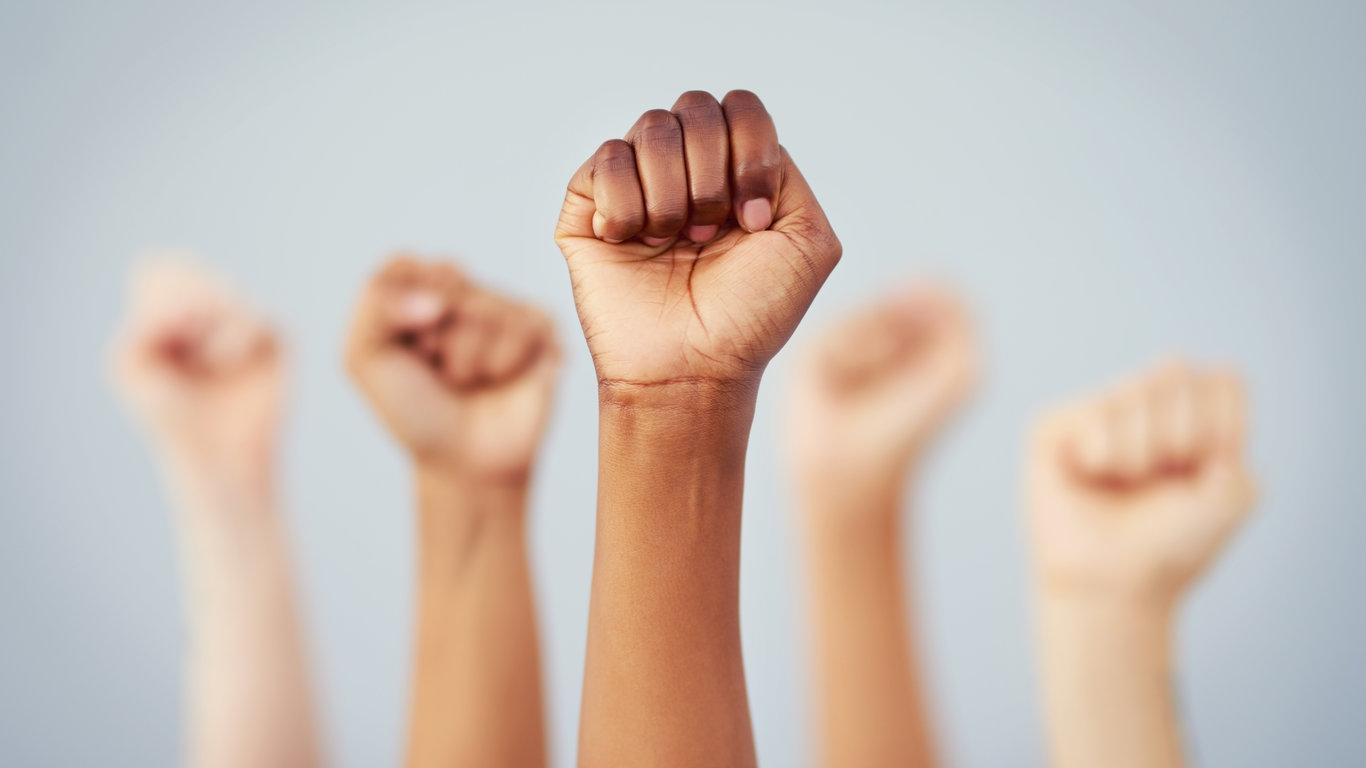 24/7 Wall St.
24/7 Wall St.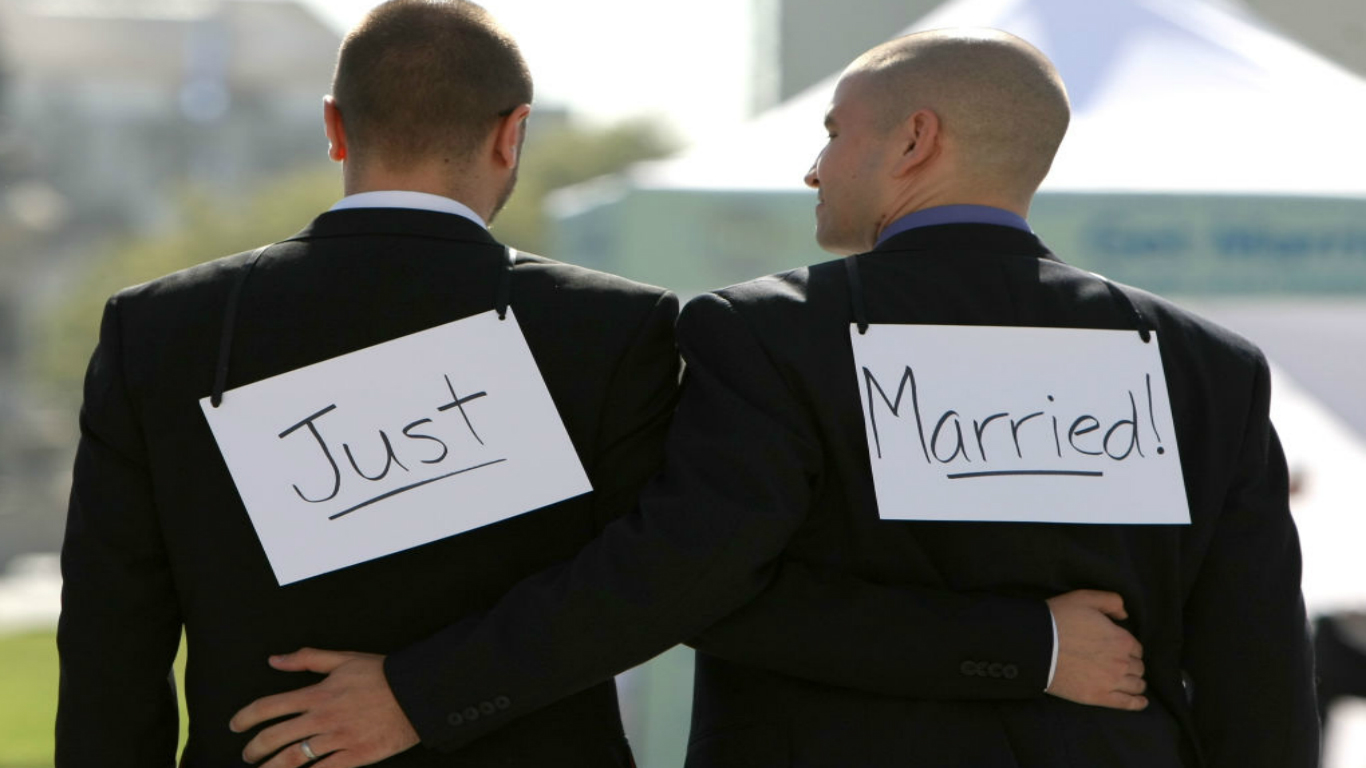 24/7 Wall St.
24/7 Wall St.